#the cycle of life and death and the cycle of attachment and suffering
Explore tagged Tumblr posts
Text
Kinktober day 9: Lactation (posting this at 1 am on the 10th but ssshh)
Rio finds you on the brink of death, but it isn’t your time yet. She takes it upon herself to nurse you back to health.
CW: Reader suffers from homophobic violence, the consent is a bit dubious
Other notes: Very gentle Rio, lots of pet names, lactation with healing properties (and aphrodisiac properties), reader becomes Rio’s pet
“Well well, what have I found this time?” Rio mused to herself as she saw you on the ground, curled up, almost unconscious.
Death. You thought to yourself. Death has come to take me. It’s just as well.
“Let’s find out what your story is, hm?” Rio said, lightly massaging your temple.
What she found horrified her. You were dragged out here by a group of men. They beat you half to death, in theory it was because you were suspected of being a witch, in reality it was because one of them suspected you of trying to seduce his girlfriend.
“They don’t even truly know of the power you hold,” Rio said quietly, “it’s not your time to go yet, little one.”
That was the last thing you heard before blackness took over your vision.
You woke up in a cave, on a mat of woven vines.
“Sorry, I don’t have guests often and I don’t really sleep, this was the best I could do on short notice.” The strange witch who saved you said.
You tried to get up, you were unsuccessful, wincing at pain coming from your abdomen.
“Easy there sweetheart.” She sat beside you on the mat as you laid back down.
“I thought you were Death, coming to collect me.”
“Well in a sense I did, just not in the way you expected. But you can call me Rio.”
“Rio?”
“Rio Vidal, at first it was just a pseudonym, but I’ve gotten a bit attached to it.”
“River of Life, so Death has a sense of humor.”
“Gotta have one in my line of work.”
You chuckled lightly, which caused you to wince again.
Rio reached a hand out, very cautiously, to brush some hair out of your face. “I can help you with that, sweet thing.”
“Yeah? Why do you want to help me?”
“Someone’s a bit mistrustful.”
“Can you blame me?”
“No I cannot. Look, here’s the deal. I have something I need help with, and you can help me with it.”
“What exactly does Death need help with?”
“You forget that at the end of the day, I am a green witch. And there’s a little side effect of that I need help with.”
You looked at her confused.
“What exactly do you know about witches?”
“Not a lot. Managed to find an old banned book about potions but that’s been about it.”
Rio nodded slowly. “Okay well…how should I break this down? I can help heal you, quickly in fact.”
“Okay. And in return I?”
“You help me get my breasts to stop aching.”
Your eyes widened.
“You drink from me, it heals you, I get rid of my milk from this cycle.”
You could not believe what you were hearing. She had to be joking right? Maybe Death’s sense of humor was more twisted than you thought.
Then Rio flung her top off, and you saw her nipples leak a bit. “Think you can get on your side or do I need to straddle you?”
“Does it have to be like, mouth to tit? Can I not use a cup or something?”
“You could if I had any.”
“Right, right, guess you don’t really need to do the ‘sustenance for survival thing’.”
“Look, sweetheart , you can spend possibly months healing, unable to sit up for weeks. Orrrrrr, you can put your mouth on my tits and both of our lives will be so much easier.”
You really did not mean to be staring at her chest, but they were big…full, and right in front of you.
“You’re not exactly being subtle, doll.” Rio said, bringing a hand to cup one of them. “C’mon, it won’t take that long, you don’t even need to drink all of it to heal. And I’ll still get some relief.”
Fuck it. You thought to yourself. “Okay. Y’know making a deal with Death was not really on my agenda for today.”
Rio smiled. She slid next to you and gently coaxed you to your side. You cautiously wrapped your lips around her nipple. She stroked your hair encouragingly.
“There you go, just like that.” She let out a moan. “Oh you’re good at that baby.”
It really did work quick. You were already starting to feel better. You felt calmer too. You weren’t sure how to describe what it tasted like, but it was good, and you wanted to keep going.
“Mmm, feeling better baby?” Rio asked.
You were but you found yourself in a haze. It just felt so good to keep sucking. To keep drinking Her in.
“Mmm, I bet you are. You should be all healed up actually. But you can keep drinking that works for me. You’re awful cute like this.” She scratched at the back of your scalp and you moaned around her.
“Maybe I should keep you. Yeah, I think I’ll do that. You’d like taking care of me like this every month, wouldn’t you pet?” Rio mused as she petted you.
“Other side now if you wouldn’t mind. Not that you’d mind very much right now.” She chuckled.
You readjusted so that you were on top of her, now drinking as much as you could from her other tit.
“It’s been so long since I’ve had such an eager little mouth on me. You feel so good pet.” She reached an hand between her legs. “You’re being so good for me baby, just keep sucking.” She said as she started to rub her clit to the sight of you.
She had stopped leaking into your mouth so you detached and realized how worked up you had gotten…how worked up she had gotten.
“Kiss me, pet.”
You didn’t hesitate to obey. Her free hand wrapped around the back of your neck as she let you explore her mouth with your tongue. You moaned into her.
“Easily excited little thing aren’t you?” Rio whispered against your lips. “Fuck baby I’m so close, fuck, yeah keep looking at me like that.” She said as she grabbed your jaw, wanting those big doe eyes on her for as long as possible.
You felt her shake underneath you as she came. Eye contact broken as she screwed her eyes shut in pleasure. You stroked her hair, totally in awe.
Rio composed herself and brought her fingers to your lips.
In that moment you realized you never wanted to be done tasting her, every part of her.
“Such a good little pet. Already so well trained.” She teased. She adjusted you so that your legs were on either side of her thigh. “This is the last thing I want from you tonight okay? Can you cum for me, sweetheart?”
You nodded and started grinding against her. Every sensation seemed so intense tonight.
“I did forget to warn you about something my dear. See I can just heal people, but if someone is healthy, then drinking from me can act…as a bit of an aphrodisiac. Feeling a little fuzzy?”
You nodded and continued rocking your hips against her.
“I could have stopped you I suppose. But you were just so cute. And I bet if felt really good didn’t it?”
You nodded again, whimpering.
“And I bet this feels amazing right?”
“Uh-huh” you moaned out.
“Oh did I make you lose your words? That’s okay. Pet’s don’t need words, they just need to hump or suck, or whatever else I tell them to do. And right now? I want you to cum.”
Your body complied with her demand. She took your hips and made sure you rode all the way through it. You collapsed on top of her.
“Big night huh sweet thing?”
“Mhm.”
“Get some sleep my dear. I’ll be right here.”
342 notes
·
View notes
Text



"It's the failed poet I see, tell me, how does such a fine lad like you end up in the military?"
" ...I'm everything at once, a poet, an officer, executioner, part-time art enthusiast, landlord, and a Walt Whitman devotee. But at the current moment I come as an informer because the sheep screaming in your barracks sounds like a case of human trafficking and cops are about to break down your doors - so cut it out."

My home reality - a script.

My World, In a Synopsis.
Born alongside his twin sister, Lily, to parents Edward and Maya Allard, the love provided by his family was destined to set off his life in harmony, only if money wasn't a problem. The money wasn't the problem, actually, it was his parent's heroic acts of justice, being lawyers, they took their oaths to an extreme, finding victims of the wicked society and representing them free of cost in court; the visibility of their bravery wasn't only visible to the media, the NGOs and the oppressed, but unfortunately to the oppressors as well.
It doesn't take much thought or time for a bullet to be fired, however it has the ability to ruin many lives all while taking some.
Losing his parents, he was orphaned at the young age of 8 months, his grandparents, whom were confident enough to disown their own children in the past, upon the lost of their own blood, decided to take one of both siblings for themselves, to raise until their own hearts gave out.
The bolder one of the lot, his paternal grandfather decided to speak up, leading to another two death of his grandparents in the same manner; the boy somehow reached an orphanage, as if he was destined for it, like a cruel cycle of despair.
The neglect and coldness of the orphanage made him run away from it, a bag packed with only a cookie and a picture of his parents in their teen years, his misfortune again struck. Getting hit by a car. That car belonging to a two star General. Little did he know, that was a blessing in disguise, a silver lining, his innocent mind was unaware of the legal and financial troubles that unfolded right after hitting a pedestrian with a vehicle.
His ability to charm anyone and to attach himself to the nearest adult, he eventually warmed the heart of the cold General, General Cyrus. Suffering from chronic loneliness, and his irrational aim of arranging an heir to manage his hierarchy in the military, he ended up adopting the boy.
The boy grew up spoiled yet humble somehow, due to being the wealthy General's only son. He understood the assignment, to reach his father's position in the military; his genius and cunning nature made it easier; along with his pride in himself.

The more you know..
Nepotism, an impressive face-card and his own talent, wits and skills led him to command a unit with more than 3000 troops, in response to their loyalty, he memorized each of their names and birthdays; sending them handwritten cards on it.
Double agent or a double laborer? Little does everyone around him know, he also works as a military detective, keeping tabs on everyone and everything that goes around him.
While all of his other interests might be self claimed, one thing everyone knows about him is that he keeps every living breathing animal he comes across at his unit, whether it's a small bunny, a wild cow, he'd brand it off as military's responsibility, assigning bulky soldiers duty to feed them grass and hay on time.
Centre of attention at all times, sometimes for negative reasons, it's good he has a literal brigade of soldier supporting him.
Self proclaimed anti-hero, this one's true.
Wealthy due to working on a commission bases; most of his money is spent on books, and leaving hefty notes of cash in people's pocket when they aren't looking, like the opposite of a pickpocket.
Doesn't like being called young, although he is 23 years old. Gets really happy when he's compared to a wise and learned old man.
Likes to quote Walt Whitman at any given moment.
His father will go to create lengths to prove his son is right; so much so he himself had to sit his father down and explain to him what a "Karen" is.
Likes to tinker with machines and electrical equipment, often breaks them.
Everyone's favorite, for some miraculous reason.
Leo, his fiancée, the age difference between them is a year, they've been childhood sweetheart. Leo and his father have an alliance of keeping an eye on him; makes sure he's not trying to burst a balloon with a lighter at 3am, the second time.
Romantic in nature, flirts with his fiancée at any given time.
"Sweetheart, the bathroom mirror's broken did you-"
"Damn, the mirror must have gone into shock after seeing how beautiful you are~♡"
"...we've already established that you broke it 4 days ago while "trying" to fix the sink, I'm asking if you called the plumber yet-"

Quotes
──⭒─⭑─⭒────⭒─⭑─⭒────⭒─⭑─⭒────⭒─⭑
"And this is my father, General Cyprus-."
"Sweetheart, I'm not a country. I would have called you a disappointment for this, only if I hadn't adopted you; I definitely knew what I was getting into."
──⭒─⭑─⭒────⭒─⭑─⭒────⭒─⭑─⭒────⭒─⭑─⭒────⭒─⭑─⭒────
"Sir, you were going over the speed limit, by a lot, with all due respect, putting your snipers all around the road for the sake of you speeding is unethical."
──⭒─⭑─⭒────⭒─⭑─⭒────⭒─⭑─⭒────⭒─⭑─⭒────⭒─⭑─⭒────
"Honey.. did you bring another goat into the house..?"
──⭒─⭑─⭒────⭒─⭑─⭒────⭒─⭑─⭒────⭒─⭑─⭒────⭒─⭑─⭒────
"I have to say.. this looks less like a military unit and more like a doctor's office, with all those human anatomy diagrams- actually what's going on here?"
"Shooting practice."
"..."
"???"
──⭒─⭑─⭒────⭒─⭑─⭒────⭒─⭑─⭒────⭒─⭑─⭒────⭒─⭑─⭒────

World Differences
Wars between counties scripted out, there's a clear difference between good and bad people.
Scripted out basic discriminations.
Extended lifespans of humans.
Scripted out lighting falling onto the ground because I just want to dance in the rain with my beloved.
(..many more changes which aren't worth mentioning)

This again got messy in the end, I tried my best to be serious and mature sounding but I just couldn't.
Without covering much, it got way too long, so I had to end it here, I have obviously a lot more to talk about, so if people want it I'll definitely make a part two.
Also the "he" is me, my DR self. I did it intentionally for privacy reasons.
Otherwise, if you want to know more about my DR, my experience there, pleaseeee DM me, I'd love to talk.
ooh I would love to help you with world building, if you have a similar DR to my mine I would love if you told me about it.

#reality shifting#shiftblr#shifting antis dni#shifting#shifting blog#shifting motivation#shifters#shifting community#shifting stories#desired reality#shifting script#shifting reality#permashifting
82 notes
·
View notes
Note
I’m half-asleep so this idea is weird but how bout something like Xanthus watches Love get turned by Audric but as Xanthus feels the bond dying he feels a sense of peace as he’s “freed” himself from the bond or something. Audric is evil, Love tries to get Canthus to help them but instead he just looks at them as if they weren’t someone he knew and just acts like that. Yeh idk man.
Love Lost
Xanthus Claiborne x Reader
Audric loomed over you like a threat. His sharp teeth hovered just above your neck — just above the pulse point where he could practically feel your thundering heartbeat — and the bastard had the audacity to raise a single eyebrow at Xanthus.
‘What are you going to do about it?’ he seemed to sneer. ‘What are you going to do about it, when I take the person you love most in the world? What are you going to do when I drain them? What are you going to do when I reach inside your chest and shatter your heart like you did mine?’
You could not see the look Audric was giving him, but something must have reflected in Xanthus’ eyes. He could feel your burning terror through the bond. It was making him tremble. It made him sick.
Xanthus wanted to scream. He wanted to break through the bars of his prison, tear that monster away from you and tuck you away in a secluded corner of this world where nobody would be able to hurt you ever again.
The thought that Audric would kill you — like the look in his eyes promised him he would — made him feel like he would go insane.
“Don’t,” he pleaded, appealing to the shreds of humanity he knew his old mentor possessed. He knew Audric. He could not have changed this much in the centuries that had made them grow apart. “Please,” Xanthus breathed, searching his gaze.
The bitterness he found made his blood run cold.
“Watch me, Lawrance,” Audric said, sinking his teeth into your neck.
You let out a startled scream, squirming in his grasp. Audric was not gentle as Xanthus had been. His fangs piercing you hurt. The amount of blood he was draining from you made your head spin. You tried pushing him away, but you could do nothing against the vampire’s firm grip on you in your weakened state.
“Xanthus!” you screamed with all the strength you had left, overwhelmed by pain and fear. Audric was going to kill you, and there was nothing you could do about it. The outcome was inevitable. It felt like staring down the edge of a cliff when you were already halfway down. There was nothing stopping the freefall, and the landing would hurt.
Xanthus watched as Audric drained your life away. He knew he could have killed you in an instant if he had wanted to, and the realization that he chose to draw it out to increase his suffering made him want to tear him apart even more.
“Xanthus!” you cried with a choked-off sob. He could feel your panic, the desperation you tried to fight off as your inevitable fate drew nearer and nearer. You were going to die, there was no question about it.
When had he allowed you to become his weakness? Audric only had this much power over him because he had allowed himself to get attached to you. How many centuries had he spent above such things? How long had he been without a fatal flaw, carefully distancing himself from everything that had the possibility of hurting him, only to feel his heart crumbling to pieces in this very moment?
It had been so long since he had cared about anyone, and seeing the light in your eyes slowly diminish reminded him just why that was. Death was inevitable, and in a life as long as his was, he did not have the capacity to live through endless cycles of love and heartbreak before his heart withered away again and again.
“Xan–!” you mumbled weakly, your head lulling to the side. Black spots danced in your vision, and the room around you had suddenly turned freezing cold. Your limbs felt heavy, and it was a battle you were beginning to lose to keep your eyelids open to look at Xanthus. He was blurry, and your eyes would not focus on the person you still counted on to make everything alright.
Perhaps he could help you. Perhaps he would save you.
Xanthus only looked at you, chiseling away at the bond Audric had nearly broken. If he did not feel anything for you, it would not hurt when you inevitably touched the ground. If he did not allow himself to love you, he would not break apart when you inevitably died.
Perhaps this was a good thing. Perhaps living without weakness was the fate he needed to follow as a vampire.
As you closed your eyes for the last time, Xanthus felt something within himself snap. Your lifeless body tumbled to the ground. Audric stood over you, the blood once strongly pumping through your veins staining his mouth and shirt. He looked at Xanthus, waiting for a reaction.
Xanthus stared back. He felt apathy. This very moment felt like a waste of his time. The enemy before him was nothing but a waste of space, thinking he could inconvenience him.
Audric frowned, his patience thinning for the outcry of anguish he expected to hear from Xanthus any minute now. Any minute, he would vent the heartbreak he knew he felt. Any minute, he would show him just how deeply it had hurt when he cut out his heart and left it dead at his feet.
“You have lost,” he said, licking the blood from his lips and savoring the taste of his revenge. “The bond is broken.”
Xanthus looked at him. In one swift movement, he got up from the ground, walking to the bars of the cage that kept him trapped here for days until he stood face to face with Audric.
“I don't care,” he said.
Audric’s face fell. “You— but—” he stammered, looking at him bewildered.
This could not be. His extensive research into the bond had told him people went mad with heartache. He wanted to make him feel the pain he had caused him when his entire family was slaughtered — he wanted to make Xanthus suffer as much as he had, all the years knowing they were dead and he wasn’t.
Xanthus’ hands shot out, gripping the front of Audric’s shirt and pulling him against the bars of his cage. He could feel the stutter in Audric’s breath as his cold, gray eyes bore into him.
“I don’t care,” Xanthus said, reaching for his neck. Nobody would dare to try and find his weakness again. There was none. “What are you going to do about it?”
60 notes
·
View notes
Text
What's 'Star Wars' about?
A while ago I got an 'Ask' that concluded with "what is Star Wars about, if not the Jedi, right?" And weirdly enough... I have to disagree.
I mean... to me? Yes. Star Wars is about the Jedi. A Jedi-less, Sith-less, lightsaber-less Star Wars movie or series will struggle to get me on board (which is why I was surprised that I loved Andor so much).
But if you read everything George Lucas said, if you think about the Jedi's place in his two trilogies... they're not front and center, right?
Sure, there's Luke Skywalker... but he's a learner, in the Original Trilogy. Same goes for Anakin Skywalker and Obi-Wan Kenobi, in the Prequels. They're going through character arcs.
Otherwise, the Jedi are either used as mentors to the protagonist...

... or to deliver exposition...
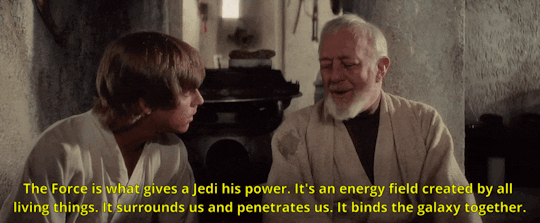
... but they're mostly vectors Lucas uses to present his thesis.
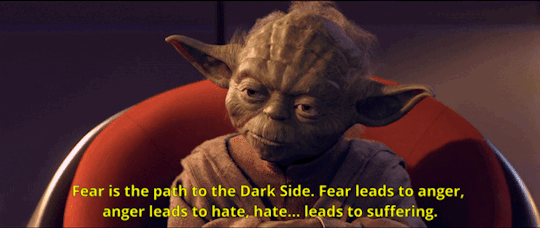
Functionally-speaking, the Jedi are important in that they embody the Buddhist philosophies the movie's themes are based on.
But when it comes to the plot, they're secondary. That's because the the themes of these films are bigger than the Jedi themselves.
So the question becomes... what's are the themes?

The primary goal of the Star Wars films is to inspire kids to start thinking outside the box and teach them a set of values and psychological motifs that have been passed down through mythology and fairy tales.
These values can be summed up in the dichotomy between greed and compassion / selfishness and selflessness / pleasure and joy.
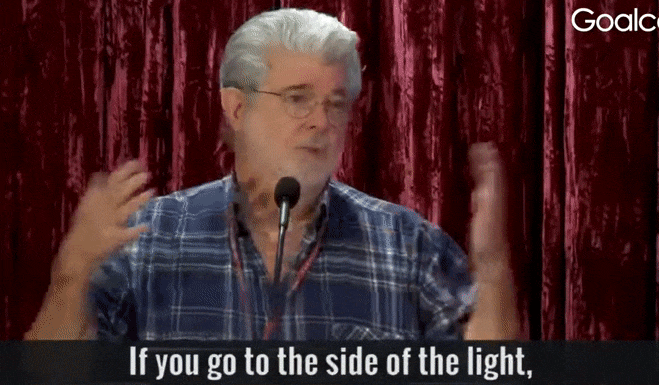

We all have both aspects and need to strike a balance between the two. After all, being greedy ultimately comes from fear and being afraid can happen to all of us. Problem is, unchecked fear can lead to anger, hate and a whole lot of suffering.
The more selfish you are, the more you want things and the more you're afraid that you'll lose everything you have, you'll get angry when someone tries to take it and that will hurt everyone around you.
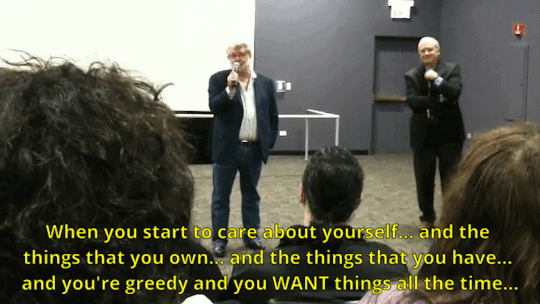
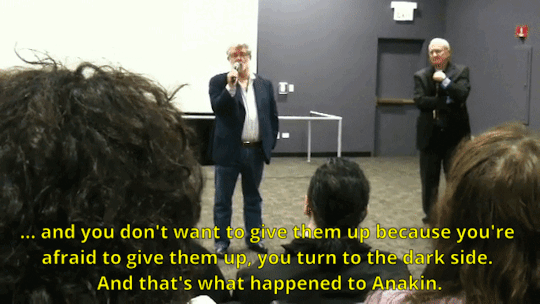
In other words, fear is the path to the tempting/addictive Dark Side.
Thus, seeing as we'll be inevitably tempted by the Dark Side and give in at some point (because nobody's perfect), we should aim to be as selfless and compassionate as possible for our own good... but also for the greater good, because we're all connected to a life energy. You can call it Qi or God; in Star Wars it's known as the Force.
As such, we all form a symbiotic circle and working with that in mind is better than putting ourselves first and draining from everything and everyone around us.
But we also need to be careful because there will be people who give in to that selfish side and will try to control everything. When the time comes, we must stand up for what's right.
So that's Lucas' thesis.
If I had to sum them up, the six movies illustrate it as follows:
The Prequel Trilogy is about the consequences of greed, explored through Anakin on a smaller scale and the Senate on a larger one.
The Original Trilogy shows the triumph of compassion, through Luke, Leia & Han and the Rebellion's fight against the Empire.

Lucas talked about it multiple times, the Prequels are about how Anakin becomes Darth Vader and how the Republic becomes the Empire, and in both those cases, it happens because they're greedy.
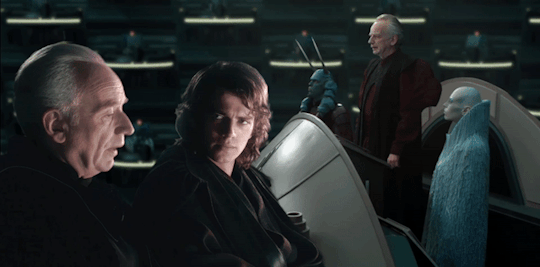
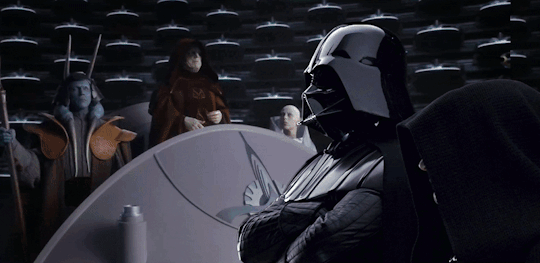
The Senate is greedy in the more classical sense. They could give a shit about "symbiosis", no they're taking bribes, letting corporations dictate policy, using loopholes to keep themselves in power and halting any meaningful progress out of fear that the new status quo will conflict with their own self-serving goals.
Anakin's greed manifests in a different way. He turns to the Dark Side because of his attachment. He wants to stop Padmé from dying... but not because he wants to save her, rather he wants to save himself from feeling the pain of loss again and will do anything to not have to live without her, her own wishes and the natural cycle of life and death be damned.
In both cases, they cave under pressure orchestrated by Palpatine, but nobody puts a gun to their head. They make a deliberate choice that comes from a selfish place, and neither one takes personal responsibility for it, they blame others, the Separatists in the case of the Senate and the Jedi in Anakin's case.
The Republic becomes an Empire with thunderous applause, betraying the people it was meant to protect.
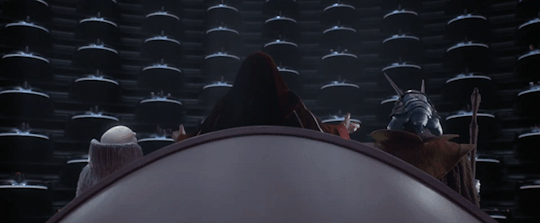
And when faced between doing something he knows is right and giving in to his selfish desires...
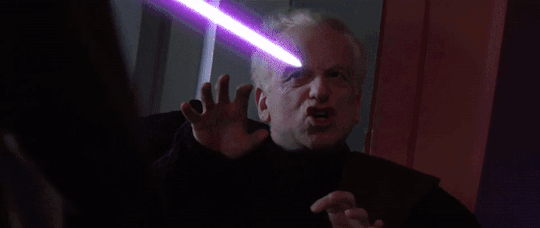
... Anakin elects to do the latter, thus betraying his family and leaving the Force in darkness.
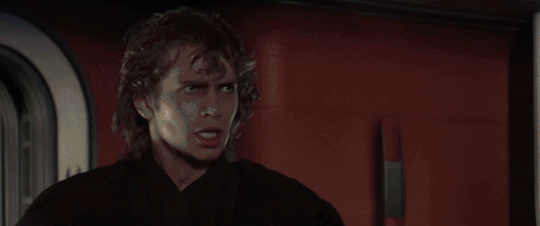
These selfish choices impact the galaxy as a whole, including the only characters in the trilogy who were doing their best to be compassionate and live in symbiosis: the Jedi, Padmé and Bail.
These champions of the Light Side are stuck playing catch-up or helplessly witnessing the events unfold, throughout the trilogy. They're playing by the rules and Palpatine uses this to his advantage.
Thus, as the galaxy tears itself apart because of Palpatine's manipulations, the Jedi and Bail are ignored and gradually weakened until they're either rendered irrelevant or killed.
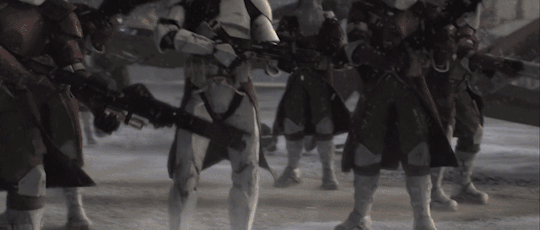
A new order is born, one built on blood, lies and greed: the Empire.
But a new hope remains.
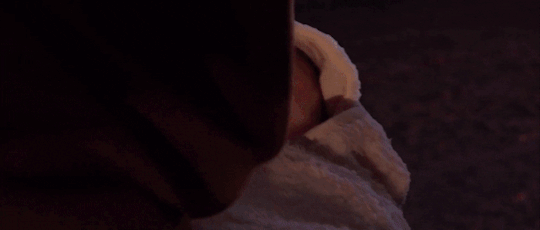

While before, the Jedi and people like Bail stood alone as everything around them became willfully corrupt... now, a Rebellion inspired by their legacy has banded together to overthrow the current order. But they don't fight for power or personal glory, they fight for altruistic, compassionate reasons. There's a sense of general responsibility that moves them, they're all doing their part.
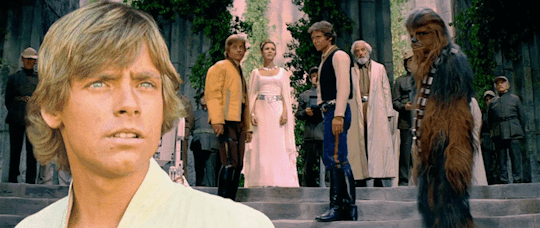
On a larger scale, we focus on the Rebels, who are tired of seeing people suffer and decided this needs to stop. They have gone from being passive, to proactive.
On a more personal scale, we see the evolution of Luke, from naive farmer to a hero, and guess what? More and more selfish people - like Han or Lando - are inspired to join the Rebellion, after seeing the exploits of Luke, Leia, or even Ben.
It all culminates in the final film, wherein:
The Rebels band together with the Ewoks - literal teddy bears whom the Empire, in their arrogance, never even considered to be a threat - to destroy the Second Death Star and free the galaxy from imperial tyranny.
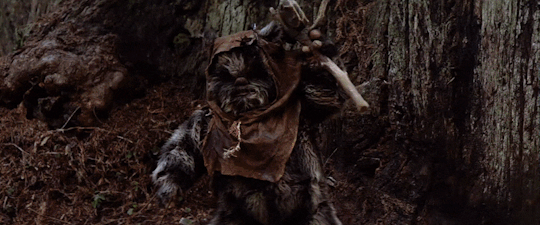
At the same time, Emperor Palpatine pressures Luke, who is tempted by the Dark Side like his father was.
But instead of giving in to his selfish desire to kill Darth Vader for all the horrors he's done...
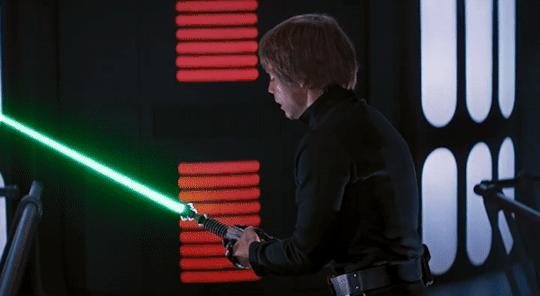
... he finds the strength to rise above it, instead showing compassion for his father, which, in turn, inspires Anakin to do the same.
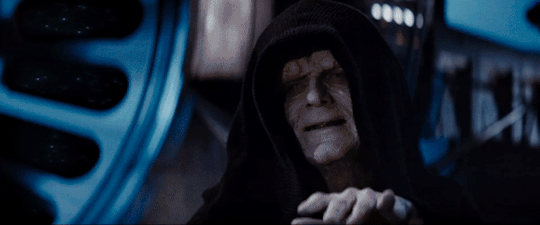
He faces a choice, like he did in Palpatine's office, two decades prior...
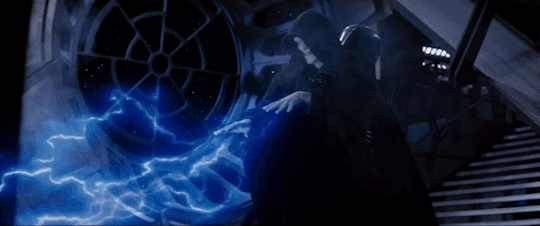
... and this time he chooses right.
Children teach you compassion. Anakin lets go of his fear and anger, and saves his son at the cost of his own life, finally bringing balance back to the Force.
Good triumphed over evil. Its champions achieved victory by being selfless, hopeful and fighting together / helping each other.


And that's it, that's how the movies thematically tie together.
As you can see, the Jedi aren't that directly impactful on the overall plot, because it revolves around Anakin, Luke and the respective factions/institutions around them.
But what the Jedi do bring to the table is their ability to teach and inspire others, both in-universe and out. They're spiritually impactful.
The Jedi are the epitome of compassion, and it's partially through them that George Lucas teaches his values to the audience.
#to be clear: Star Wars doesn't HAVE to be about all this#This is just me trying to summarize what Lucas said in all his interviews and speeches#The post-Lucas Star Wars transmedia franchise made the Jedi more central than they were originally meant to be; especially in the Prequels#You see this in interviews from current SW creators /writers#but also small stuff like renaming the Prequel era “Fall of the Jedi” when it was originally named the “Rise of the Empire” era#meta#george lucas#star wars#jedi order#the force#anakin skywalker#luke skywalker#prequel trilogy#original trilogy
734 notes
·
View notes
Note
After Limited Life Grian passed on the message that the games were over, The Watchers were bored of them and their suffering, and wanted a new meal.
Now the players were free, but what is freedom when you’ve been living in a cycle of violence for years? What’s freedom when you’ve spent so long murdering those you once called friends, gaining and losing pets, experiencing death over and over again.
Cleo isn’t sure, but she tries to remember what she did before. They used to make statues, beautiful statues and sculptures of a variety of things, sometimes it was a gift for a friend, other times it was something they had been commissioned to make. So she starts that up again, crafting their feelings into art and creations, trying to process the trauma.
When Martyn had rocked up on her door in the middle of the night, months after Grian had set them all free, she’d been in the middle of a statue. They left their basement and opened the door, surprise covering her face as she saw Martyn. He looked worse for wear than she remembered, his phantom wings more torn than usual and his hair a mess, but most noticeably was the emptiness in his eyes.
Martyn took a step forward before collapsing against them, and her arms instinctively wrapped around him, holding him close to her. He let out a whimper and buried his face into their chest, tears streaming down his face.
“Hey, hey,” Cleo spoke softly to him, wrapping her arms around him tighter. “It’s okay,” she hummed, “what’s wrong?” Martyn said nothing, only crying harder.
Cleo pulled him inside, setting him on the couch next to them, his head on her lap. Martyn was still crying, but after a few minutes he calmed down enough to speak. “I can’t find Ren, anywhere. I thought since we were free he’d be back but I can’t find him anywhere. I’ve gone across the entire country, I’ve spoken to authorise, I’ve even asked Grian to ask the Watchers for help. But they refused, and now I have no hope.”
Martyn sobbed through the words, but Cleo understood, running their hands through his hair. “Hey, hey, it’s okay.” She hushed him, playing with his hair as they spoke. “Can you walk? I have something to show you.”
To Cleos surprise, Martyn nodded and sat up. She smiled at him, and grabbed his hand before leading him towards the basement. He trailed a little behind, but she kept the pace slow so he could keep up despite the clear stress and anxiety.
Once the two descended the stairs, Cleo’s current work came into view. It was a collection of statues, hearts all lined up in a row. Each heart had a line down the middle, each heart showing a double life pairing. Theirs was the one currently being worked on, and while her side was covered in stitches, Martyn’s had a phantom wing attached to his.
Martyn’s eyes widened at the sight, letting go of Cleo’s hand as he approached the heart statue. “It’s beautiful…” he said in surprise, and Cleo snorted at his tone.
“You don’t need to sound so shocked,” she said with an eyebrow raise.
“No, no, I didn’t mean it like that. I just, I thought you hated Double Life.”
“I hated the betrayal,” Cleo corrected him. “I hated the feeling of loneliness, I hated the fact I couldn’t feel like I could trust you. But you made it up to me in Limited Life, and even Pearl and Scott managed to reconnect at the end. When I was first freed, I went to the old school I taught at and I realised it wasn’t the same anymore, that I wasn’t the same anymore. The life games were predictable, we always knew how it would end. There was comfort in it, in a strange way. So when I was trying to figure out how to move on, I first wanted to make a tribute to my favourite season.”
Martyn turned his gaze to her, tears beginning to stream down his face again. “Cleo…” he trailed off, unable to speak.
“We’ll find Ren,” Cleo promised, “wherever he is. I don’t know how long it’ll take, but we’ll find him. We can find everyone, I’m not sure we can heal alone.” They paused for a moment, before smiling. “I’m glad you came to me Martyn.”
Cleo can't offer a magic solution. But then, they both know Martyn didn't expect that of her. There is no magic wand that can be waved, but there is understanding and a burden shared.
There is also rest. Forced on Martyn, of course, because he's a stubborn prick and would keep working if they didn't drag him to bed themself.
Cleo won't go back on their word. They'll find Ren. And they'll find the others. And they'll heal. Just like Martyn, now, sleeping soundly for the first time since the games began.
#hermitshipping#trafficshipping#ask#cleo tag#martyn tag#ren tag#treebark#zombiewood#z0mbiew00d#mod 🎀#weekly theme: art
33 notes
·
View notes
Text
PAC reading!! (Pick a cat reading!)
Choose a cat you feel drawn to, that’s your message!!
By EarthKittyTarot
1. 🔮 2. 💰


Bottom of the deck for both piles:

The overall message for both piles is surrender to abundance. Now it the time to embrace change and transformation, as a new door is opening for you. Surrender to change, activity and progress that’s taking place in your life at this moment. In this next stage and chapter of your life, you will learn to take control of anything that bothers you. Learn to let go of what you don’t need so that you may be successful and create new ways of being for yourself.
Ask an angel oracle card // Surrender, archangel azrael:
Death, like life, is constant. Everything in existence is constantly dying, and being reborn from the cells in our body, to our thoughts and feelings, to the constant shifting cycles of nature. Like most aspects of nature, the human psyche also goes through larger cycles. The Earth has her days, nights, 28 day moon cycle, 12 month sun cycle and seasons just to name a few.  We also have cycles and more often than not they are in complete attunement to the natural cycles. Whether that be through day, night, the weather, seasons or astrology, we have cycles and rhythms that are in tune with nature, regardless of whether we choose to be conscious of it or not.  The part of the cycle coming up here is death. At this stage we deal with a release and a surrender. We must at this stage release some aspect of our life and our self. Beyond that we must release the ego; the part of ourself that is attached to identity, to itself being seen, being right, the part that buys into the illusion of believing that we can can ever truly know the unknowable. At this time a surrender must occur. A surrender to God, to Life, to Great mystery, the universe and the higher intelligence that exists in love. Once this occurs, a new kind of freedom is achieved within the psyche and the spirit and we become a clean slate for a new phase to begin. A death phase can be exciting, terrifying, ecstatic, devastating or even all of the above, depending on what is occurring for you. Humans are generally petrified of giving up the ego self. This is why we are afraid of death. But the ego must now be released in order to experience new life. Ultimately all that can be done is to process whatever feelings are coming up and surrender to this divine and natural cycle of consciousness. Inability to surrender will only result in this part of the cycle being a longer, more drawn-out and difficult process than it necessarily has to be. Above all, a true sense of liberation now awaits you. A new phase. Change is occurring now, embrace and surrender to it.
Pile 1:
Archangel: Michael
Oracle card: Clearing
Letters F, S & C could be significant for this reading.
Overall, what I got from the cards is that you have suffered a mental conflict or battle. What seemed ideal to you is now a cause of conflict. You must choose to clear away and walk away from this mental battle, and restore peace and harmony once again. The five of swords reveals arguments and conflicts with others, and moving on is now required if you are to find mental harmony. The battle is over, your opponents have left and you are now left to deal with this battle mentally. Call upon archangel Michael to help you clear away this situation once and for all. In the five of swords definition it says “ Regardless of the provocation, deal with your anger and disappointment. There’s a saying “it’s all over, bar the shouting.” Don’t keep shouting too much longer or hope to revisit the situation or relationship. It’s done.” Take the wisdom you have learned and learn to walk away. In the card the person is alone and no one is around anymore. Everyone has moved on except for you, use the wisdom and self respect you have to finally make your gracious exit from this situation. The sphere associate with this card is geburah, or power, which means conflict and judgment- in this five of swords, it reveals the need for power and control, the impetus behind the battle. Now, use what you’ve gained from dealing with this and clear it away, the storm is abating.
Clearing explained: In order to have clarity in your life, you must be clear. Clear of old ties, old issues, and old thought patterns. Clear of any mental, spiritual, emotional or physical clutter. If this card has come up for you, this means there are areas in your life in need of clearing. On a physical level, it may be time to clear your home. Throw away anything that is not relevant to you now or for the future life you want. Clean out all closets and corners. Get light and air circulating through your home. Clear your body, fill yourself with fresh, nourishing food that is easy to digest and supports your system. Most importantly drink at least 2 Litres of water a day. If you are feeling unclear on an emotional level, the first thing you can do is spend some time writing and journaling exactly what you are feeling. If you write at least a few pages every day, it will provide you with a direct reflection of what is going on for you and what you can do to resolve present issues. It also provides you with the space to release, pent-up energy and emotion. You may need to release someone or something from your life. You may need to cut the ties with a person, place or event or clear an old emotional issue. Once you take the time to see what needs clearing and releasing, it becomes easier to take the action necessary to allow that to happen. It may be necessary to review your mental and spiritual space at this time. Where are the old thought patterns, beliefs and self talk habits polluting your mental and spiritual space? Often the key to breaking the habit is to create a new one that is more supportive to your growth and happiness. If you’re telling yourself things that are not in line with your highest truth and highest potential, it’s time to simply start telling yourself something different. It may take work, lots of discipline and awareness, but you will get through and change the mental pattern if you keep repeating, and honoring the new thought pattern. Ultimately, you need to take space for yourself now. Create a sense of inner stillness and calm. Then with strength and courage, clear away the clutter and destructive ties in your life.

Pile 2:
Archangel: Metatron.
Oracle card: heaven and earth.
Letters K, C, H & E could be significant for this reading.
The overall message I got from the king of cups and the heaven and earth card is that once you’re able to take command of your emotions you’ll be able to find answers to any questions you may be having at this time.I also got acceptance from looking at the king of cups. The king of cups can be seen as an aspect of major arcana card #4, The Emperor, which signifies control, security, order and ambition. You are becoming conscious and awake, learning to master and have control over your emotions. Your feelings influence your ideas and thoughts. Remember to look back at the past and find acceptance; if you ran on autopilot, on destructive beliefs, or neurosis that you developed through the various influences or traumas you may have experienced throughout your life, the time is now to surrender those influences and beliefs, so that new ones may form. You exist in the psyche of God, playing your role, using free will to the extent that you choose. Everything you learned has taught you a lesson, and now is the time to operate within the greater sphere of energy. You have the power to create evolution and a revolution within. Forgive yourself for how you have operated in the past and know you are connected to all that is and has ever been; those who came before and who will come after you as well. Once you realize you are connected to the divine, you will start to operate with more peace, ease and grace. The time is now to create a revolution in your life, one that will bring about satisfactory results. You have the power to transmute feelings into ideas. Shifting from heart to head. Mental clarity comes when you have control of your emotions. Operate within the greater sphere of energy for best results. Integrate your past experiences and see how you can take control. Open up to new consciousness and awareness of yourself and your life. Emotional control creates mental clarity. Follow your heart and act based on higher principals, and remember you are a Spiritual being having a human experience.
Heaven and earth explained: Heaven and earth, human and divine, the flesh and the spirit. These polarities are often considered so different and yet, one does not exist without the other. This is the truth that, once integrated, truly sets us free. What if we couldn’t exist without God and God couldn’t exist without us? What if we were God dreaming? God, experiencing itself for pleasure, movement, and evolution? What if we were existing in the psyche of God, playing our roles, using free will to the extent that we choose, yet operating within that greater sphere of energy? We could have the power to create revolution/evolution within this space. We would truly be co-creators with God. When we connect to the idea that we are intricately linked to everything in existence, we become larger than ourselves. We become eternal. We become one with all who have come before us and those who will follow. All things become reflections of ourselves and reflections of God simultaneously. Once we realize that we exist in this state of oneness, we may begin to open up to the power and potential we hold on this space. Everything we do, think and believe affects the whole. Yet most of the time we walk blindly through life, believing we have free will, yet choosing to act based on personal fears and limitations, family, social or cultural beliefs about what is and isn’t the right thing to do. Or we act based on destructive beliefs or neurosis that we have developed through the various influences or traumas we may have experienced through our lives. When we act or attract from this place, the outcomes are generally mundane and predictable and not the product of free will but rather the product of programming. The true use of free will occurs when we think and act from a place that is free and at one with the divine, holding the power and potential of all that is. It comes from understanding the true potential that exists within every moment and the understanding that everything we do and think affects what will occur in our life, what we will experience and that in turn will affect the whole of existence. When we integrate the idea that heaven and earth, the flesh and spirit, human and divine, although polarities, are one and we have the power to affect and experience oneness with the whole, we will become conscious and awakened.

#pac#pick a card#tarot#divination#2025#tarot cards#tarot reading#surrender#release#transformation#let go#clarity#clearing#heaven and earth#Spotify
37 notes
·
View notes
Text

Mouthwashing and the crews alternative versions in how fish is made
Pls read the above post before reading this one! ^^
We have all the symbolic characters in mouthwashing

Daisuke is the fish that is stuck in the foam, he is stuck in the same place and doesnt know what to do or how get out. (Break his cycle of freeloading and figure out what he wants to do in life)

Jimmy is the fish alone eating a meat cake (he still doesnt get a real cake even in how fish is made as i went through the symbolic meaning of the cake is most probably the representation of responsibility or the goodness in life) or he could also be the fish in a the foam ball we play as he uses others to advance in the game(life) meaning he consumed others for his advantage.

Anya, is the fish that is h*nged that still has a baby attached to it by its ambilical cord, while the baby fish is crying (as she pregnant but the main fish is dead the main fish being anya)

Swansea, is the fish surrounded alone by mouthwash (this can be interpreted as we know when Swansea was younger he was an alcoholic, different and a lamb lost from the herd. This is younger Swansea surrounded by alcohol, begging the character to take him with them saying he was stupider to do all this and he wants to go back to where he was before and he was stupider to think he was different.)

Curly.. is curly in this game. He is our captain and our salvation we are consuming others to get onto his level. The most interesting dialogue we get is when he tells us a joke,
Three men are in the hospital.
The first man cries ‘i lost both my hands, they told me ill never work again!’
The second man wails ‘i lost both my legs, they told me I’ll never work again!’
The third man rejoices ‘i lost my hearing, they’ll never be able to tell me im fired again!’
This refers to curlys place in the main game mouthwashing, curly lost all his limbs, but you know what he didn’t loose? His hearing. His sight. Curly is the first two men. But he wishes he was third because even if he couldn’t work or move he saw the suffering. He saw everyone’s death and heard it, even though he wishes he hadn’t.
If you liked this analysis and figuring out the connection between how fish is made and mouthwashing check out my other analysis below!
#curly#mouthwashing#anya#anya mouthwashing#curly mouthwashing#daisuke#jimmy#Swansea#how fish is made#mouthwashing fanart#mouthwashing analysis#mouthwashing headcanon#daisuke mouthwashing#Swansea mouthwashing#jimmy mouthwashing#mouthwashing game#mouthwashing fandom
51 notes
·
View notes
Note
Hey Capn’. i’d like to project a scene for you
(Echoes https://youtube.com/playlist?list=PL05gkJPL0kUn7RLasvjnkK615yGnAhFLU&si=GtPeFzJG8OipYqWJ)
there’s a world where life and death are connected like a ring, or some say a spiral. Like sleep like death you wake up again - whether you want to or not.
the people of this place, along with every living creature, are aware of this cycle; that it is full of suffering. Their goal was to ascend above and beyond it.
they made a utopia where no one had to work and only ever pursued their interests. but even when they had everything they wanted, they still desired to escape. ascension promised them all their desires, free of the struggle. they found a way.
however those who had too many attachments, had too much ego, or weren’t ready didn’t quite leave and didn’t quite stay. Forever stuck, always observing
had you all landed there, do you think you’d have wanted that too, even with that risk? letting go of your animosity, your carnal desires, relationships, and your ego, all so that you might get that lasting peace? Do you even think you could?
- ⛈️
Mm... these are nice. Peaceful.
Hm... Not sure I understand. But eternal life sounds kind of shit, if I'm being real. I figure if we'd landed there our goal would have been to get out and get back home, but if we were trapped for long enough, well... I think Daisuke's the only one of us who might be able to handle the idea of eternity. Maybe Swansea. Jim would like the idea of it. Don't know how well he'd handle it in practice, but maybe he'd surprise me. Anya and I, though, we'd never last. We'd want out. But that's just my thoughts based on this limited information.
#mouthwashing#captain curly#curly mouthwashing#curlyposting#jimmy mouthwashing#swansea mouthwashing#daisuke mouthwashing#anya mouthwashing#rain world
21 notes
·
View notes
Text

Pluto in the 1st House Natal - Welcome to your Rebirthday Party
written by astrolocherry
When her white dress is soaked in the blood of roses sewn in her hair again, …It’s just like they always said, She looks best in red
The girl born with Pluto in the 1st House is the Hades’s special and secret favourite incarnate. This is because He knows this lifetime and the pageant of Priestesses that transform to accept the crown will be absolutely delectable to witness. Though she will always be His baby during her Pluto in the 1st incarnation, fighting harder than anything because she hasn’t quite figured it out yet. Struggling severely during the dark abduction periods because she hasn’t discovered the meaning in Who She Is and greater purpose in all of this. If she is willing to undertake the inner work, the light of consciousness provides the sought remedy; the sight for seeing through the darkness. The realignment with her archetypal Divine drama as a Heroine descending into the hidden bloodsheds of the inner and unconscious collective worlds while she carries out the duties of her everyday life. While being held prisoner by the Prince of Darkness, it is Mother Love that she unconsciously seeks.
The Pluto in the 1st physical interface is a crematorium of her old selves, birth place of the Prophetess, and her ancestral crossroads. Lost ghosts, generation cycles, and unfulfilled ancestral duties accompany these rituals too. Dark Mothers and Angels from the Underworld are sent to protect and ensure the child arrives in the correct realm on earth, rather than transitioning to the World of the Dead. The Mother may have suffered greatly through the ordeal, potentially fearing the death of the child or herself. The birth date may be significant to the family in some way; such as occurring on the anniversary of a loved one’s birthday or passing, or follow a recent tragedy. The scene may have replicated a murder, rather than a birth with violent, chaotic, and rushed movement aligning the mother’s worried screaming, lack of opportunity to instantly bond, and paralysing coldness that never truly resolves. There is a spiritual vulnerability that exposes her to all sorts of threats from the inner world and the one outside. She is susceptible to malevolent influence and the danger of those wanting to take that innocence away, becoming the attachment of someone’s desire, or a prisoner to another person’s will. It is this helplessness that will come to reveal the dimensions of power lying beneath and within, from Mother came this Daughter, immortal lore and love is what binds her.
Read More
#pluto in the 1st house#1st house pluto#pluto signs#the feminine blood mysteries of pluto and the 8th house
37 notes
·
View notes
Text
Ok. I’ve recently had a thought that is super depressing (for me) and I need to share. Don’t care how improbably this is, I’m just a sucker for depressing ideas.
So, we know demons can sometimes meet those important to them before going to hell. And though we never officially see what Kokushibo experiences before going to hell, we all want him to meet Yoriichi for a final reconciliation.
But what if Koku meets no one?
What if Yoriichi already moved on?
We see in the fandom that Yoriichi is portrayed as someone who deeply loves his brother, given he kept the flute long after Michi became a demon. But he also didn’t hesitate to kill him, even though his love prevented him from doing the final blow.
We often think he would stay behind to wait for his brother, wishing to be with him, but…
What if, after he died, he just… accepted his brother’s decision and moved on? What if Kokushibo is the only one obsessing over the other, and thinks Yoriichi will greet him in death but finds no one?
Everyone has moved on. His mother, his father, his wife and kids and even his twin. No one waits for him before he goes to hell and all the future lives he is reborn into, he is alone.
They’ve moved on. Only he’s trapped obsessing over the past. And when they have long left the cycle of suffering and reached nirvana, only Michi remains clinging to his grief and jealousy and desires.
His desire to remember. His desire to repent. His desire for forgiveness and his desire for their love. To see his twin again and make up for all the wrongs he’s done to him.
Yet, he never sees any of them again, in any life. And as he obsesses over this, the guilt and his desires clawing at his heart, he finds himself the last man yet to escape the cycle of suffering. The last soul to remain in the hells.
Cause to reach nirvana, you have to relinquish all your attachments and desires; including relinquish clinging to people.
In the end, he knows he was the only one thinking of the other. His parents moved on. Yoriichi moved on. But not him. And he can’t.
Just… I find this idea to be so heartbreaking, but it might just be me.
#writing#kny#demon slayer#my post#kokushibo#kimestu no yaiba#michikatsu tsugikuni#yoriichi tsugikuni#I’m sorry for the ramble#but I just can’t stop thinking about this#but like a lot of fanfic I’ve read portrays Yoriichi as being obsessive over Michikatsu#but the canon doesn’t show that#only Michi/Koku is obsessed with Yoriichi#not the other way around#like yeah Yoriichi loves his brother#but he ain’t obsessing over him#and I’ve seen people talk about this#but this isn’t to say I’m telling you to stop writing that way#do your thing#but I’m just explain how I got this idea#which stemmed from the idea that only Michi/Koku is obsessed with Yoriichi and Yoriichi has moved on#and yeah I might be making it ooc#but I don’t care#I’m a sucker for tragedy#feel my pain
22 notes
·
View notes
Text
The Philosophy of Buddhism
Buddhism is a spiritual and philosophical tradition that originated in India around the 5th century BCE with the teachings of Siddhartha Gautama, known as the Buddha. Buddhism encompasses a wide range of beliefs, practices, and schools of thought, but at its core, it is concerned with understanding the nature of suffering, the path to its cessation, and the ultimate realization of enlightenment.
Key Themes in the Philosophy of Buddhism:
The Four Noble Truths:
Dukkha (Suffering): The first noble truth is the recognition that life is permeated by dukkha, often translated as suffering, dissatisfaction, or stress. This includes both the obvious sufferings of pain, aging, and death, as well as more subtle forms of mental unease and dissatisfaction.
Samudaya (Origin of Suffering): The second noble truth identifies the cause of suffering as tanha (craving or desire) and ignorance (avidya). This craving is not only for physical pleasures but also for existence, non-existence, and various forms of attachment.
Nirodha (Cessation of Suffering): The third noble truth asserts that it is possible to end suffering by extinguishing its causes, namely craving and ignorance. This state of cessation is known as Nirvana, which represents the ultimate liberation from the cycle of rebirth and suffering.
Magga (Path to the Cessation of Suffering): The fourth noble truth outlines the path to the cessation of suffering, known as the Noble Eightfold Path. This path provides a practical guide to ethical living, mental discipline, and wisdom.
The Noble Eightfold Path:
Right Understanding (Samma Ditthi): This involves understanding the true nature of reality, particularly the Four Noble Truths.
Right Intention (Samma Sankappa): Cultivating intentions of renunciation, goodwill, and harmlessness.
Right Speech (Samma Vaca): Speaking truthfully, avoiding gossip, lies, and harmful speech.
Right Action (Samma Kammanta): Acting in ways that are ethical and non-harmful, following principles like non-violence and honesty.
Right Livelihood (Samma Ajiva): Engaging in work that does not harm others and is ethically sound.
Right Effort (Samma Vayama): Cultivating positive states of mind and preventing unwholesome states.
Right Mindfulness (Samma Sati): Maintaining awareness of thoughts, feelings, and actions, leading to greater self-understanding and wisdom.
Right Concentration (Samma Samadhi): Developing deep states of meditation that lead to profound insights and the cultivation of wisdom.
The Three Marks of Existence:
Anicca (Impermanence): Everything in life is in a constant state of flux. All phenomena are transient, and clinging to anything as permanent leads to suffering.
Dukkha (Suffering): Suffering is an inherent part of existence, arising from the impermanent and unsatisfactory nature of life.
Anatta (Non-Self): There is no permanent, unchanging self or soul (atman). The belief in a permanent self is an illusion that contributes to suffering.
Karma and Rebirth:
Karma (Action and Consequence): Karma refers to the moral law of cause and effect, where intentional actions lead to corresponding consequences. Good actions lead to positive results, and bad actions lead to negative outcomes, both in this life and future lives.
Rebirth (Samsara): Buddhism teaches that beings are trapped in a cycle of birth, death, and rebirth (samsara), driven by karma and craving. The ultimate goal is to escape this cycle by attaining Nirvana.
Nirvana:
Liberation from Suffering: Nirvana is the ultimate goal in Buddhism, representing the cessation of all suffering, the end of the cycle of rebirth, and the realization of ultimate truth. It is a state of peace, liberation, and enlightenment.
Beyond Dualities: Nirvana transcends all dualities and conceptual distinctions, including the dichotomy of existence and non-existence.
Meditation and Mindfulness:
Central Practices: Meditation (bhavana) and mindfulness (sati) are central practices in Buddhism, aimed at cultivating concentration, insight, and mental clarity. These practices help individuals develop a deep understanding of the nature of reality and the mind.
Vipassana and Samatha: Two main types of meditation in Buddhism are Vipassana (insight meditation), which focuses on gaining insight into the true nature of reality, and Samatha (calm-abiding meditation), which develops concentration and tranquility.
The Middle Way:
Avoiding Extremes: The Buddha taught the Middle Way as a path that avoids the extremes of self-indulgence and self-mortification. It represents a balanced approach to spiritual practice that leads to enlightenment.
Practical Wisdom: The Middle Way also refers to the balanced application of wisdom in everyday life, guiding ethical conduct and mental development.
Dependent Origination (Pratītyasamutpāda):
Interconnectedness of All Phenomena: Dependent origination is the principle that all phenomena arise in dependence upon other phenomena. This interconnectedness means that nothing exists independently, and everything is part of a complex web of cause and effect.
Causality and the Cycle of Suffering: Understanding dependent origination is key to understanding the cycle of suffering (samsara) and how to break free from it.
Ethical Conduct:
The Five Precepts: Buddhism provides a set of ethical guidelines known as the Five Precepts, which include abstaining from killing, stealing, sexual misconduct, lying, and intoxication. These precepts help cultivate moral discipline and support the path to enlightenment.
Compassion and Loving-Kindness (Metta): Compassion (karuna) and loving-kindness (metta) are central ethical values in Buddhism, encouraging individuals to act with care and concern for the well-being of others.
Schools of Buddhist Philosophy:
Theravada Buddhism:
Focus on Early Teachings: Theravada, also known as the "Teaching of the Elders," adheres closely to the early teachings of the Buddha and emphasizes individual liberation through wisdom and ethical conduct.
Arhat Ideal: The goal in Theravada is to become an Arhat, an enlightened being who has attained Nirvana and is free from the cycle of rebirth.
Mahayana Buddhism:
Great Vehicle: Mahayana, or the "Great Vehicle," offers a broader interpretation of the Buddha's teachings and emphasizes the Bodhisattva path, where practitioners strive to attain enlightenment for the benefit of all beings.
Emptiness (Shunyata): Mahayana philosophy introduces the concept of emptiness, which suggests that all phenomena are empty of inherent existence, highlighting the interdependence and impermanence of all things.
Vajrayana Buddhism:
Diamond Vehicle: Vajrayana, or the "Diamond Vehicle," is an esoteric form of Buddhism that incorporates rituals, mantras, and meditation practices aimed at achieving rapid enlightenment. It is closely associated with Tibetan Buddhism.
Tantric Practices: Vajrayana involves complex tantric practices that are believed to transform the mind and body, leading to enlightenment.
The philosophy of Buddhism is a profound exploration of the nature of existence, suffering, and the path to liberation. Through its teachings on impermanence, non-self, dependent origination, and the cultivation of compassion, Buddhism offers a comprehensive framework for understanding and overcoming the challenges of life. Its emphasis on mindfulness, ethical conduct, and wisdom provides practical guidance for achieving inner peace and spiritual awakening. Whether through individual practice or engagement with the broader community, Buddhism continues to inspire and guide people in their quest for meaning, peace, and liberation.
#philosophy#epistemology#knowledge#learning#education#chatgpt#ontology#metaphysics#ethics#Buddhism#Four Noble Truths#Noble Eightfold Path#Dukkha (Suffering)#Anicca (Impermanence)#Anatta (Non-Self)#Karma and Rebirth#Nirvana#Meditation and Mindfulness#Middle Way#Dependent Origination#Theravada Buddhism#Mahayana Buddhism#Vajrayana Buddhism#Engaged Buddhism#Buddhist Ethics#Buddhist Philosophy#Bodhisattva Path#Compassion (Karuna)#Loving-Kindness (Metta)#Mindfulness (Sati)
33 notes
·
View notes
Text
Seems like there is some discourse on twitter/now X on the afterlife after SPOILER ALERT it was revealed that Sukuna’s unborn twin had a soul (still considered one soul with his though) that reincarnated.
This makes reincarnation canon in the jjk world, which I guess it always was, if we think about the implications of how tengen and the star plasma vessel and the six eyes were tied by fate.
I was particularly interest in the implications on Gojo and also since the chains of fate that tied them are broken.
I touched on north and south in previous analysis posts. As much as I love Gojo, he was never going to be revived because it just made sense for Gege to finish his character arc that way.
With the newer chapters showing that his brain was bleeding, and that he was sliced in such a way where his heart and gut may be cut through, it also wasn’t going to be likely.
North was starting anew, meaning rebirth / reincarnation. Not returning to life as Gojo. Gojo was satisfied with his life as he left it.
So it seems like maybe the airport was limbo. And he opted for South, as the chapter title indicated. To go back, which Mei Mei’s words to Nanami seemed to be accepted by those present. Going back to the past, as they once were.
I couldn’t really read or find multiple discourses on the subject on twitter (just a couple), but I think they’ve expanded it in the direction I touched on in my recent post on souls that went a bit too far. In sum, were all six eyes users in the history of Japan the same soul - Gojo Satoru?
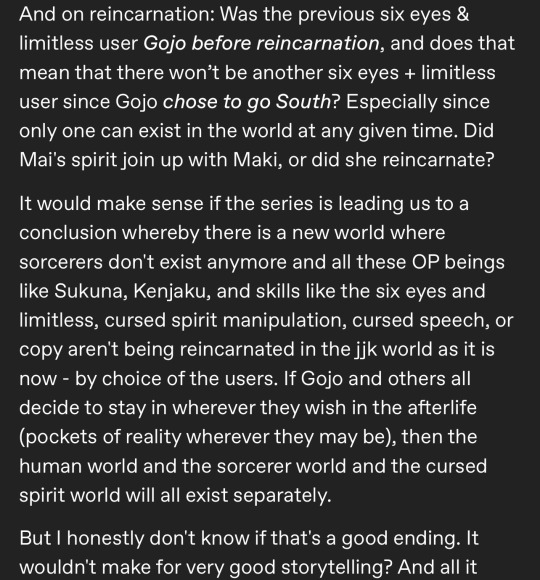
Someone’s interpretation was that Gojo and Geto were also tied by fate, seeing as a CSM user can help regain balance in the world due to the increase in curses caused by the presence of six eyes + limitless like with Gojo’s birth. But this was never canon or ever officially mentioned.
I wonder myself if, in this lifetime, the cycle of rebirth / fate was broken not only because of Toji and Kenjaku, but also because of a CSM user like Geto allowed someone strong like a six eyes user to understand empathy and love. To connect with those weaker than him and not keep coming back to life - as per Yuta who questioned Uro -
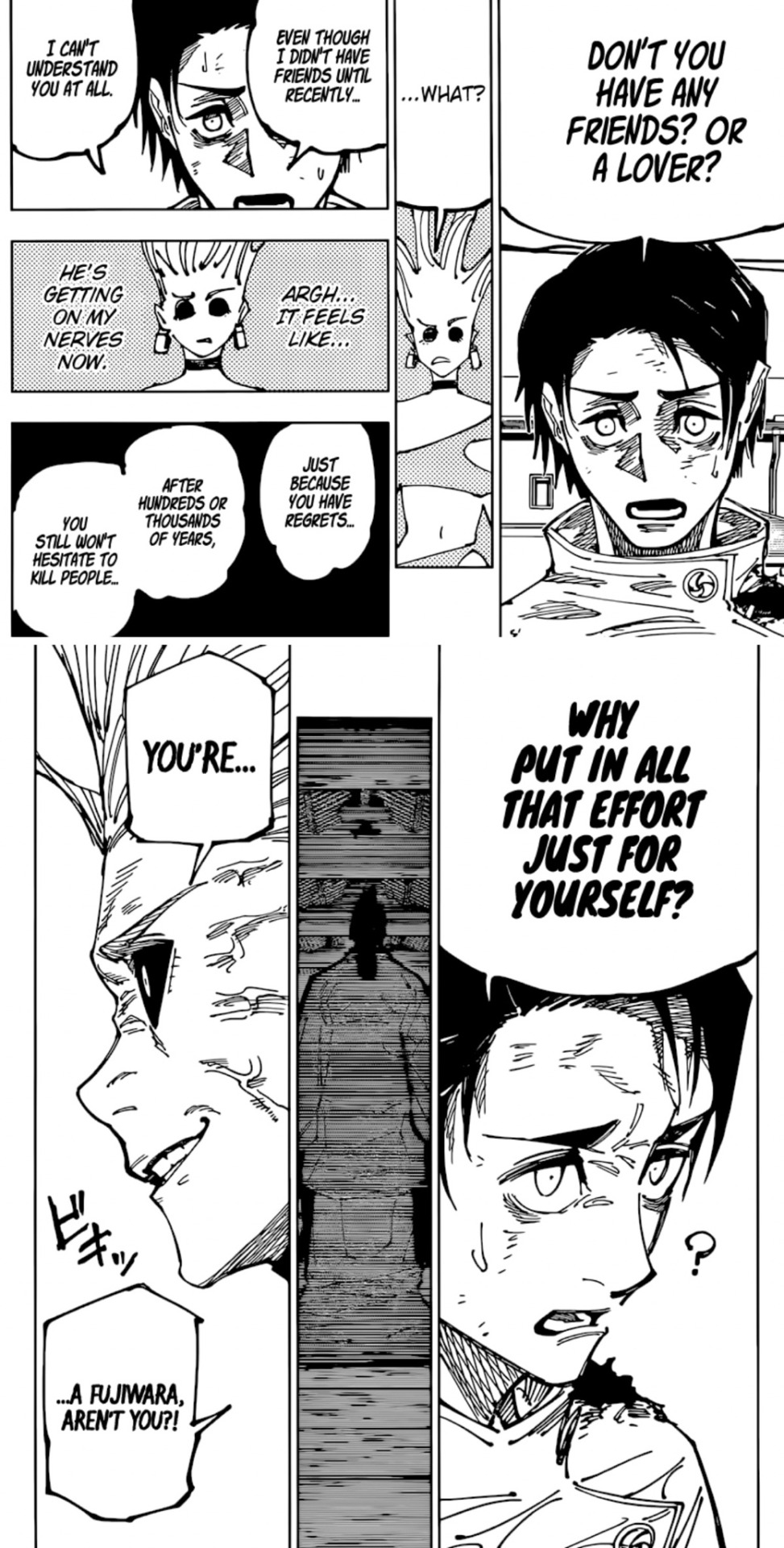
Why do you keep coming back? Those with compassion and loving kindness (again Buddhist themes) may become free from the suffering and cycle of rebirth/reincarnation. Why keep choosing to? I guess the focus is on unresolved and unfinished business.
So instead of choosing to reincarnate as someone new, the cycle just ends, as they all choose to remain as souls and go South. To stay as they are. Together.
I still stand firm in my desire to believe what i wrote a while back on Camillas and musings on the afterlife:
The cover of vol. 26 was Gojo visiting
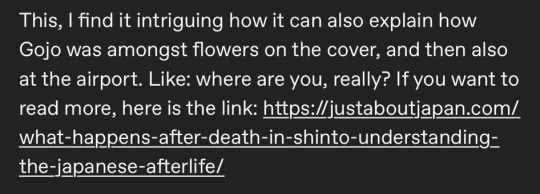
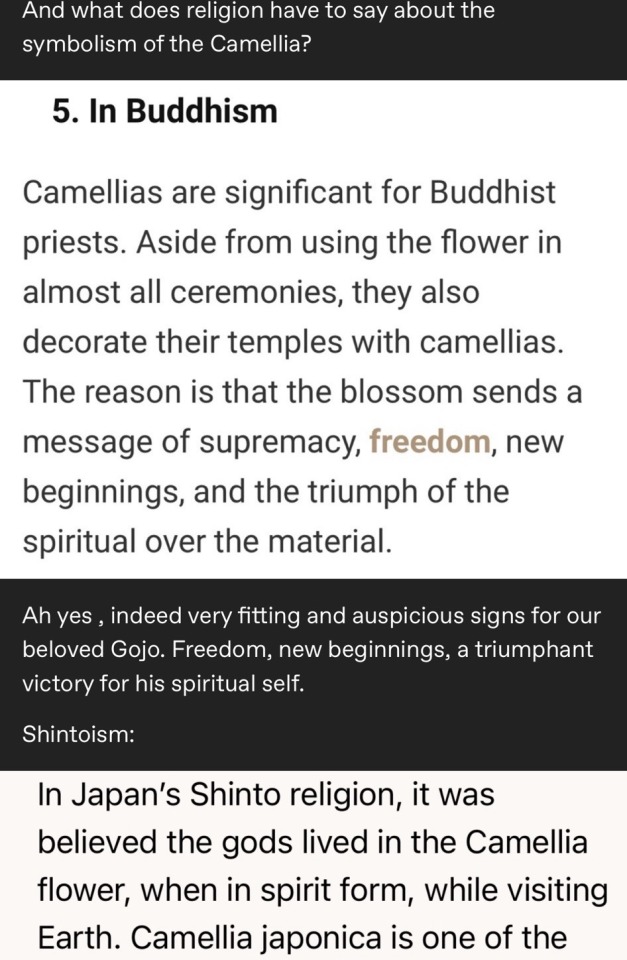
And they are a form of souls that died without regret, thus elevated to a Kami (or deity):
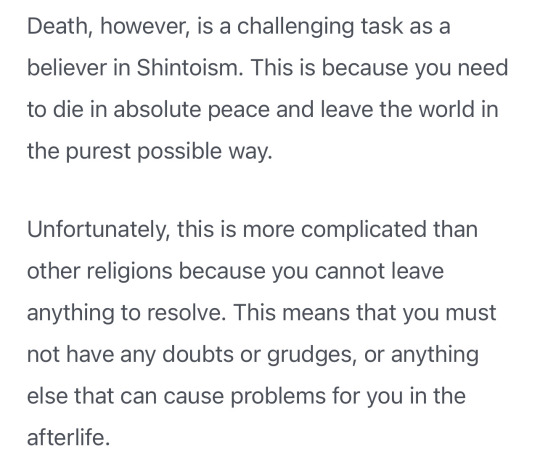
I think / headcannon that in the jjk world they are souls not bogged down with vengeance or being forced to reincarnate. They all presumably died, free of lingering attachments to the world.
This may allow those who died “without regret” to choose where they can live in another world. Which is pretty much a Shinto belief, but when applied to the jjk world, may depend on how they died.
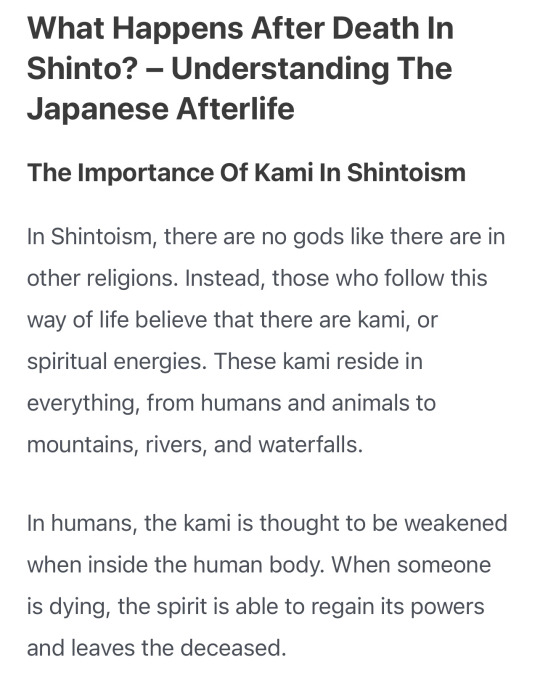
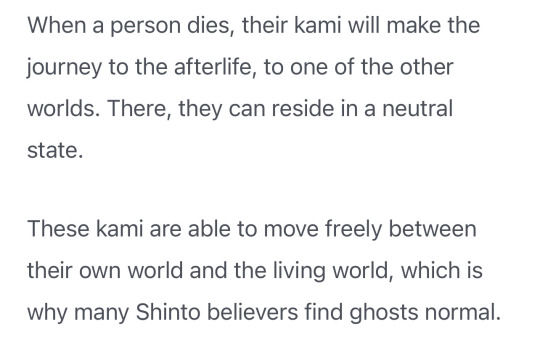
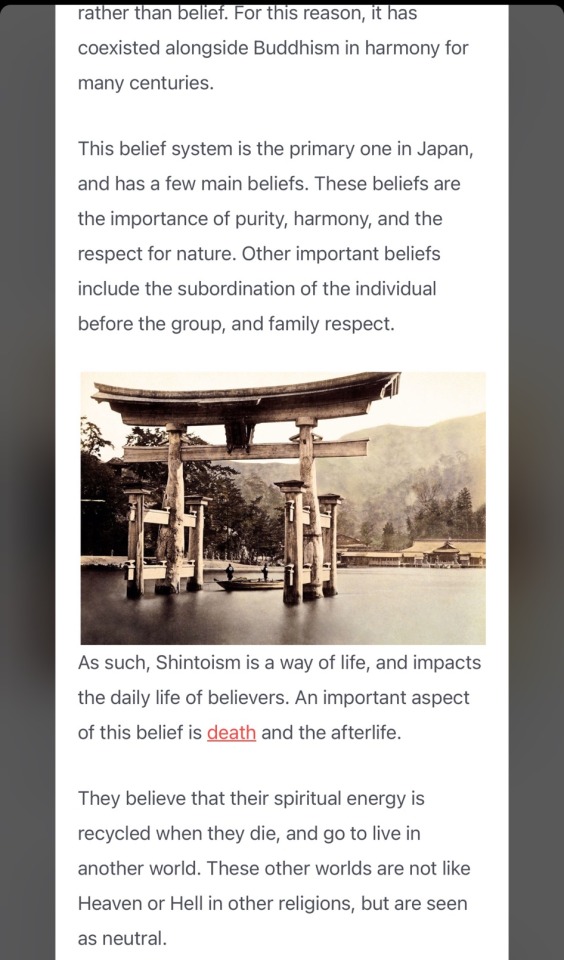
Anyway, I’ll be waiting until Gege reveals more about what it all means within the jjk world. For now, here’s the link on the info on Shintoism I took those grabs from: https://justaboutjapan.com/what-happens-after-death-in-shinto-understanding-the-japanese-afterlife/
I also forgot to add this piece:
#jujutsu kaisen#jjk analysis#jjk meta#jjk spoilers#satosugu#gojo satoru#geto suguru#jjk#stsg#jujutsu kaisen theory#jujutsu kaisen theories#jujutsu kaisen meta#jujutsu kaisen analysis#jujutsu kaisen afterlife#jjk afterlife#jjk stsg
60 notes
·
View notes
Text


Nirvana (Nibbana) Talon Abraxas
The Meaning of Nirvana in Buddhism (End of Suffering Explained)
The various Buddhist traditions differ in their interpretation of nirvana, but in general, nirvana is the ultimate goal of Buddhist practice. Although beyond words, we might describe nirvana as a cessation. Nirvana represents the end of suffering and complete liberation from the karmic cycle. In some Buddhist traditions nirvana is synonymous with enlightenment. Others view it as a significant step along the way to full Buddhahood.
Nirvana is a Sanskrit word that may be translated as extinction. In Theravadan Buddhism it is often referred to in the Pali language, as nibbana. So, what is it that goes extinct when we reach nirvana? Nirvana is the cessation of samsara, the endless cycle of death and rebirth that we experience as suffering.
If we find the notion of rebirth challenging, that’s ok. We can see evidence of samsara in this one life. Despite our best efforts at getting what we want and avoiding what we don’t want, our satisfaction is short lived. We feel trapped in a never-ending cycle of wins and losses, destined to always be striving for more.
To experience nirvana is to experience total freedom from the hamster wheel of unenlightened living. Gone is our suffering and its causes. We’re fairly adept at finding temporary relief for life’s pains. To reach nirvana, however, is to find a permanent solution. It is the end of suffering and the end of future suffering, in this life and the next.
What Causes Nirvana?
Buddhist teachings on nirvana and enlightenment begin with the teachings on the four noble truths. These teachings remind us that because the pain we experience has a karmic cause, there is also a cause to its cessation.
The question might then become, not ‘How do you reach nirvana?’, but ‘What causes nirvana?’ Nirvana is not a far-off place but a state of being, an experience we can access right here and now. It is caused by overcoming the perpetual reactivity that drives us to repeat our past mistakes. Following a practice of awakening liberates us by opening our eyes to the true causes of happiness.
The causes of this freedom are encompassed within the three-fold training of ethics, meditation and wisdom. By minimizing harm, training our minds and developing the capacity to see things as they truly are, we create new causes and conditions that give rise to the Buddha within – the discovery of our own Buddha nature.
Nirvana versus Enlightenment
In some Buddhist traditions, there is a difference between nirvana and enlightenment, or bodhi. While nirvana is the cessation of suffering, bodhi signifies full enlightenment. It is a continued process whereby we become a Buddha with the intent to help liberate all others from their pain, too.
As we progress along any authentic spiritual path and our lives become more joyful, it’s only natural to want to share that happiness with others. This is how bodhicitta, the awakened heart, begins to develop. A bodhisattva, although fully capable of never taking another rebirth, intentionally returns to samsara until all beings everywhere are liberated. This ultimate expression of compassion is bodhicitta.
Experiencing Nirvana
Meditation can give us a taste of nirvana. By observing our experience without judgment, we learn there’s actually no need to react to it or change it. We learn to relax and let go of our attempts to grasp or avoid things. It feels good when we realize we can be ok (and even happy) in this moment, just as it is.
At first, the peace we get from meditation is soon forgotten as we go about our busy day. With practice, however, we can reach a point of no return in which we never forget. This is nirvana.
In a practical sense, signs of spiritual enlightenment and awakening may include the following:
You become less attached to people, places and objects You become less avoidant and more capable of being present with your pain You become less reactive and more emotionally stable You start letting go of your past story, and allow for change You become less judgmental and more open minded You begin to see things as they are, versus as you are You feel less separate and more connected to others as well as to the earth You become more trusting of your intuition Your teacher presents themselves to you You become more aware of the suffering of others You feel driven to help others experience nirvana, too
To experience nirvana is to have realized our Buddha nature. In nirvana, we experience life and this world as a Buddha would, completely liberated from the past conditioning that has caused us to think we were ever anything but enlightened.
This is a mode of being that is beyond words, only fully understood by the one who experiences it. We do know that it’s possible, however, for the Buddha was once a suffering human too.
45 notes
·
View notes
Text
Esoteric Christianity
Part 2: Shedding the Ego and Attaching to the Divine
Previously, we looked at the concept of the inner light, which lies at the core of Christianity. This light is not of external force, but rather the reality that is embedded within our own existence. It is the true nature of who we are in Christ, and it is through this inner awakening that we can undergo true spiritual transformation.
Here, we will look at a crucial step in this transformation: shedding the ego and detaching from the material world. These are not just theological concepts; they are practical stages in our spiritual evolution. To embody the light within, we must remove the barriers that prevent its expression - ego and attachments to the temporal world.
The Ego: A False Identity
In esoteric Christianity, the ego isn't an inherent part of the self, but rather a false identity - a constructed sense of "I" that is shaped by worldly desires, fears, and influences. This false sense of self clouds our true nature and keeps us trapped in a cycle of illusion. The ego is driven by pride, fear, selfishness, and desire for control, all which cast shadow on the divine light within.
Christ's teachings challenges us to move beyond the false self and recognise the true identity as beings created in God's image. In Matthew 16, Christ calls His followers to deny themselves and take up their cross, saying, "Whoever wants to be my disciple must deny themselves and take up their cross and follow me. For whoever wants to save their life will lose it, but whoever loses their life for me will find it."
This is an invitation to let go of the ego-driven need to control our destiny and to align ourselves with God's will. Self-denial in this context is not about punishing the self or diminishing one's worth, but rather surrendering the false ego that perpetuates suffering and separation from the divine.
The Cross: A Symbol Of Transcendence
The cross that Christ speaks of here is symbolic of the ego crucifixion. It is through the cross that Christ invites us into the process of killing off the false self in order to be reborn into the truth. The act of taking up the cross isn't about physical suffering, but rather about the spiritual death of the ego - the complete surrender of the self that constantly resists God's transformative power.
In Galatians 2:20, Paul echoes this concept: "I have been crucified with Christ and I no longer live, but Christ lives in me." This passage reflects the esoteric understanding of this specific spiritual journey: the ego must be crucified so that the Christ-self may emerge. This is the paradox of the Christ path - the more we surrender our attachment to ego, the more we fully come to embody the nature of Christ, the light that was always within us.
Detachment from the Material World
Esoteric Christianity teaches that while the material world is not inherently evil, it can become a source of distraction and attachment that pulls us away from our true nature and purpose. The desire for wealth, status, and security can enslave the soul, causing us to seek fulfilment in things that are fleeting, rather than in the eternal, unchanging truth.
Christ's words in Matthew 6:19-21 urge us to reanalyse our priorities: "Do not store up for yourselves treasures on earth, where moths and vermin destroy, and where thieves break in and steal. But store up for yourselves treasures in heaven, where moths and vermin do not destroy, and where thieves do not break in and steal. For where your treasure is, your heart will be there also."
This teaching encourages us to shift our focus from external accumulation to internal spiritual wealth. Detachment is not the giving up of the world altogether, but rather the refusal to allow the material world define our worth, our purpose, or our sense of identity. It means that recognising the true treasure is within - that the inner light of Christ is far more valuable than any amount of gold.
The process of detachment involves reordering our relationship with the world, seeing it not as something to possess, control, or compete against, but as a reflection of the divine and a tool for spiritual growth. By letting go of our attachment to the material world, we allow space for God to work in our lives.
The Role of Faith and Surrender
We must also learn to deepen our faith in God's plans for us. The ego constantly seeks to control, where faith surrenders to God's will, trusting that His plan is greater than any temporary desires or fears we may have. In the act of surrender, we open ourselves up to the grace of God, which nourishes the soul and leads us to the path of transformation.
In Romans 12:1-2, Paul urges believers: "Therefore, I urge you, brothers and sisters, in view of God's mercy, to offer your bodies as a living sacrifice, holy and pleasing to God - this is your true and proper worship. Do not conform to the pattern of this world, but be transformed by the renewing of your mind."
The living sacrifice Paul is talking about here is the willingness to offer our lives to God - not as an external sacrifice, but a spiritual one, where the ego and its attachments are surrendered in love and trust. The renewing of the mind is an ongoing process of aligning our thoughts, emotions, and actions with the divine truth. In doing so, we experience the awakening of the inner light that Christ promised.
The Awakening of the Inner Light
As we surrender the ego and detach from the material world, we create space within ourselves for the inner light of Christ to shine more fully. This process of awakening is not a one-time event, but an ongoing journey of spiritual growth and transformation. It requires continuous faith, self-reflection, and a willingness to let go of the illusions that keep us bound to the false self.
The inner light is the divine spark within each of us, the presence of Christ that dwells in the deepest parts of our being. When we release the ego's grip and allow the light to emerge, we begin to live from a place of authenticity, love, and compassion. Our actions become aligned with the will of God, and we experience a deep sense of peace and unity with all of creation.
This is the ultimate goal of esoteric Christianity: to shed the layers of false identity and attachments that separate us from God, and to embody the divine light that has always been within us. Through this process, we come to understand that we are not separate from God, but rather, we are divine beings who are called to manifest God's love and grace in the world.
Living in the Light
Living in the light means living in accordance with the divine nature that we were created to embody. It means recognizing that we are not defined by the ego or the material world, but by the eternal truth of our being in Christ. As we continue on this path of transformation, we learn to navigate the challenges of life with grace and wisdom, trusting in God's guidance and surrendering our personal will to the divine will.
This does not mean that we are free from difficulties or suffering, but it does mean that we approach life with a deeper sense of purpose and meaning. We understand that every experience, whether joyful or painful, is an opportunity for growth and spiritual evolution. By living in the light, we become vessels of God's love, spreading the light of Christ to those around us and contributing to the healing and transformation of the world.
hedding the ego and detaching from the material world are essential steps in the journey of spiritual awakening in esoteric Christianity. By releasing the false self and its attachments, we open ourselves to the transformative power of the divine and allow the inner light of Christ to shine more fully in our lives.
This process requires faith, surrender, and a willingness to embrace the unknown, trusting that God's plan for us is far greater than anything the ego could imagine. As we walk this path, we experience the profound truth of our identity as divine beings, created in the image of God and called to embody His love and light in the world.
The journey is ongoing, but with each step, we move closer to the ultimate goal: union with the divine, the realisation of our true nature, and the full expression of the light within us.
#christianity#conservatives#christian faith#jesus christ#esoterist#esoteric#faith#religionblr#religion#religious imagery#christian living#christian blog#studyblr#study motivation#study blog#autism#actually autistic#autistic adult#learning#education#research
18 notes
·
View notes
Text
extremely candid, tell-all thoughts about sacrifice and familial codependency, potentially emotional incest, mentions of abuse
I have watched sacrifice become the root of all suffering, but sacrifice has become cemented as a vicious cycle with no clear path of escape as its own result.
How can I dare to place judgment or blame on my mother? A woman who gave up so much of herself in service to her disabled husband and disabled child. I watched her, when I was growing up, working up to 80 hours a week, sometimes I would stay up all night with her at the office and feel bewildered and exhilarated from exhaustion. For me it was an adventure, for her it was obligation and I can hardly imagine how she felt. Its evidence of her incredible fortitude. While she worked this hard, she was also solely responsible for taking care of the home, taking care of a significantly autistic daughter, and taking care of a negligent, drug-addicted, manipulative husband. She also hit me almost every day.
When my parents met, my father was in his early 30s (to my mother's mid-20s) and he was dying of late-stage congestive heart failure. He had 6 months to live. He lived in absolute squalor, working part-time doing something or another to do with printing signs, in spite of having a business degree, while my mom was a homeowner and worked full time in a finance position despite not having a college education. On their first meeting, my mom gave him advice on how to better maintain his long hair that he grew out to his waist but didn't wash or take care of. She was not particularly interested in him until she found out he was dying. My mom attached herself to the idea of future-widow, secretly, finding a promise of eternal validation in martyrdom. They married after 6 months and she played the role of dutiful wife; she moved him into her home, she navigated the medical system for him, she and her own mother kept him fed and comfortable, she paid for his increasingly experimental and niche treatments, and she sat at his bedside in the Mayo Clinic, both loving him and privately waiting for his death.
He didn't die. I was conceived shortly after the heart transplant. She wanted to leave him when he went back to using drugs, feeling that it was an act of disrespect to her, to her family, and to the young man who was his organ donor. She decided that leaving wasn't an option, due to the extent he depended on her. He also refused, by threats and by stubbornness, to let her leave.
The next best thing to being a widow is to be a martyr. She conceded to letting him never go back to work, and she began working longer and longer hours and striving harder. His job was to take care of me and the home. For him, this was a free ticket to eternal adolescence; for my entire childhood if he wasn't verbally abusing me he was locked behind a door, in his private room, getting high and watching either the news or Adult Swim or old concert videos on TV. He resented my natural neediness as a young child, and said to me, quantifiably more than he said anything else, "the next time you need something, I won't be there for you", and he stuck to his word. In my memory, I can't remember a single time he reacted to my needing something with anything more than complete disdain, by waving me off with his hand. He would sleep for most of the day and sometimes forget to pick me up from school. He would not sacrifice one moment of comfort for anything in the world - he is pathologically incapable of it. My mom, on top of working as much as she did, solely took care of keeping the home clean, attending to my needs, and attending to him. Again, she also hit me almost every day and openly despised me until I was an adult.
They never divorced, even though I begged her to. She would always say to me, "he wouldn't be able to survive on his own". He doesn't require around-the-clock medical care; what she meant is that he doesn't possess basic life skills. He never learned how to use the internet, does not manage his doctor's appointments, has never cleaned anything, and has never submitted a job application for himself. My mom handles all of this. When he did finally get a job, part-time at a casino, my mom delivered him lunch every day.
Once when I was really little, maybe a 2nd grader, I wrote a set of comics while at school, "My Mom is Busy!" and "My Dad is Lazy!" where I drew her going to work and him laying in bed. I wasn't trying to be mean, I was trying to depict my life. When he saw them, he insisted that I'd done it to humiliate him by lying.
For my entire life, I've watched my mom run from herself by dissolving into service to others. She dissolved her own will in service of him, by overworking, and taking on charitable volunteering on top of it. The older I get I simultaneously gain more respect for this, and more grief. I think that amount of sacrifice is a type of escape, and a type of bargaining, and a type of groveling. I think its a cycle in which she wants to do anything possible to try to prove the slightest bit of worth in herself, because she doesn't feel she has it inherently.
My entire childhood she talked horribly about herself and called herself fat and ugly even though she's always been objectively beautiful. We often dieted together and I liked it because it seemed like it made her happy in some way. I think I carry every part of her pathology, replicated into me.
Self-martyrdom is trying to outrun yourself, to displace pieces of yourself into other people, trying to force others to being your mirror, all the while making it less and less likely. It's implicitly a humiliating insult. It's implicitly dehumanizing to everyone involved. I can never dislike my mother, because you can't help but love and admire someone who faces adversity by giving more and more. I have eternal, bottomless love for her that's only made stronger by the contrast with my father, who responded to adversity by making it everyone else's problem, by being entitled and ungrateful, for feeling like heaven and earth were owed to him for absolutely nothing.
As my mother's daughter I become a martyr inherently by loving her. I want to be that perfect mirror, I want her to see the good in herself in me, instead of seeing "proof" of her perceived insufficiency. Sacrifice inherently makes you look to others to know who you are. I know firsthand that when you sacrifice yourself for a weaponized-incompetent partner, you see yourself as a subhuman, you see that nothing you can do is good enough. And it goes on permanently and you become more twisted and monstrous in your own eyes the less and less you're "appreciated". It's about the self, but it feels like overly simplistic pop-psych to call it narcissism proper. Focus on Self is displaced entirely on caretaking the Other. In this kind of sacrifice, you erase yourself and become a sacrificial object. My mom isn't a narcissist, she's completely invisible to herself. My dad is blatantly a narcissist. On top of all of this, he degrades her for her tastes and preferences and requires everything be done in accordance to his own. She is not able to watch tv shows, listen to music, etc without his open judgment, mockery, and condemnation.
But is it not narcissistic to think you can save anyone from their own decisions? Making yourself a sacrificial (thereby holy, superior, not-human) object in service is still believing you're capable of the impossible. She would have been lucky if he died. I wish he could have died even though it means I wouldn't have been born. I would sacrifice myself for her.
I struggle to break the cycle because it would be betraying her.
20 notes
·
View notes
Text
The merger will start -
- and it will bring about enlightenment for humanity.
As everyone is already aware, the world-building of Jujutsu Kaisen heavily draws inspiration from Buddhism and I think it'd be helpful to first introduce some of the fundamental ideas of Buddhism, in order to make more sense of why I am coming to certain conclusions.
Buddhism in the most basic terms:
A - The Dharma 1. Karma: Karma is the concept of the law of cause and effect. The intention of one's actions in life determine the circumstances of a person's future rebirth. 12 laws determine one's Karma, the most important of which is The Great Law: Whatever thoughts or energy you put out, you get back — good or bad.
2. Samsara and Nirvana Buddhists believe in rebirth. This cycle of rebirth is called Samsara. Samsara has six realms: The realm of gods, the realm of demigods, the realm of humans, the realm of animals, the realm of hungry ghosts and the realm of hell
The realm of humans is considered to be the most fortunate one, as it is the only one in which one can attain Nirvana, which is the only way to exit the cycle of rebirth, by overcoming the attachment to life itself.
3. Nirvāṇa (Enlightenment) Nirvana is a state of calm, equanimity, non-attachment and non-self – it is a reflection of the complete absence of emotional suffering. A common descriptor is “to have a mind as immovable as a mountain.” This is not to be confused with a state of apathy, but to be taken as a state of serenity. It is the ability to not be shaken by however desperate a circumstance one faces, because one has rid themselves of all the pillars which create suffering.
4. Bardo (Space between any two states) Tibetan Buddhism specifically identifies six states of Bardo, which refer the space between any two states. The whole of those Six Bardo are: The Bardo of This Life, The Bardo of Dreaming, The Bardo of Meditation, The Bardo of Dying, The Bardo of Dharmata and The Bardo of Becoming.
The Bardo of Becoming specifically is the transitional space after death and before rebirth. It is said to be much like a dream, in which one perceives a variety of powerful and often frightening appearances influenced by one's karma of previous lives. It’s during this bardo that signs of future life start to appear, and the consciousness eventually takes rebirth in one of the six realms of existence according to one’s karma

B - The Four Noble Truths: The Four Noble Truths comprise the essence of Buddha's teachings:
Life is suffering (Duḥkha) Suffering has a cause (The Three Poisons) Suffering can end (Nirvāṇa) There is a path towards the end of suffering (The Noble Eightfold Path)
The term “suffering” is to be taken as synonymous to “dissatisfactory”. The Buddha differentiates between pain and suffering, the latter which references mental and emotional distress. An example of pain would be to have a wounded leg, the emotional suffering that could potentially arise from such a wound would stem more mental processes surrounding wishes to be rid of the wound, worries regarding the healing of the wound, recollecting times when the wound was not present and any other ruminations of such kind.
The notion of suffering is not meant to invoke pessimism, but rather an acknowledgement of life as it is and an offering of salvation from it.
C - The Three Poisons: Buddha believed that it is three negative qualities of the mind, which cause most of our own suffering and the suffering which we cause others:
Delusion (Moha): Ignorance, not seeing and understanding things as they truly are.
Attachment (Rāga): Greed, desire or clinging. An unwillingness to let go or to accept what is. Attachment is also to be understood as a form of resistance to the impermanence of all things.
Aversion (Dveṣa): Hatred, Anger, Ill-Will
D - The Four Immeasurables: These build the foundation for the ethical conduct of Buddhists and are grounded in the intention of minimizing suffering in the world. The freedom from suffering is not just a self-centered pursuit in Buddhism but it includes the intention of not causing others suffering.
Loving-Kindness (Metta): Active good will towards all
Compassion (Karuna): Results from Metta, identifying the suffering of others as one's own
Sympathetic Joy (Mudita): Results from Metta, the feeling of joy because others are happy, even if one did not contribute to it
Equanimity (Upekkha): Even-mindedness and serenity, treating everyone impartially
The foundation of the Four Immeasueables is also reflected in the Five Buddhist Precepts, which basically is the most reduced and bare bone core of how Buddhists should live.
E - The Noble Eightfold Path: The Noble Eightfold Path is Buddha's "guide" towards enlightenment.
The eight points listed in the Noble Eightfold Path can be summarized into three main categories:
Wisdom (understanding of the Four Noble Truths)
Ethical Conduct (actions based on the Four Immeasurables)
Mental Discipline (pertains to the cultivation of a focused and still mind)
It is important to note that “right” in this context is not an antonym to “wrong”, but rather to be seen as synonymous to “attuned”, “balanced” or “harmonious”.
F - The Four Stages of Enlightenment

Once one frees themselves of all the Ten Fetters (the chains that prevent enlightenment), one becomes an Arahant and achieves Nirvana.
Now that we are all up to speed in terms of the basics of Buddhism, let's get put this into the context of some major moments, plot points and characters of Jujutsu Kaisen.
One crucial thing to take note of at the very start are the main reoccurring themes of Jujutsu Kaisen, which are
Love
Cursed Energy
Enlightenment/Evolution
Those themes reflect the most crucial aspects of Buddhism itself.
The law of balance in Jujutsu Kaisen: Wether it comes to Binding Vows, Heavenly Restrictions, the rise of Cursed Spirits in respondse to Gojo's birth or twins – the principal of simultaneously losing one thing, where one gains another, is a reoccurring motif in the story. The origin of such an idea does not stem from Buddhism, but from Taoism, most of which people know for it's infamous Yin and Yang symbol. We also see this reflected in the way Gege creates characters, which have their anti-counterpart: Gojo and Sukuna, Tengen and Kenjaku, Yuji and Mahito, Yuta and Geto.

The body and the soul in Jujutsu Kaisen: Buddhism rejects the belief of the existence of a permanent soul. Still, the world-building of JJK heavily relies on this concept, as it is one of the aspects in which Gege took some creative liberty in.
When talking about the rebirth of his twin brother Sukuna says:
"Perhaps his (Kenjaku's) mate was my other half reincarnated ... and thus possessed the same soul*.”*
Sukuna confirms not only the existence of rebirth, but also pronounces his awareness of it. Sukuna has knowledge of the existence of the Dharma.
Regarding the soul's relationship with the body Mahito says:
“Does the soul dwell in the body? Or is the body built on the soul? The answer is the latter. The soul should always exist before the body*.”*
“The shape of the body will always be dependent on the shape of the soul.”
In the Buddhist faith the self is not made up of one permanent core, but consists of five factors, which are constantly subject to change. But in Jujutsu Kaisen the soul is the permanent core of a person, which remains unchanged as one moves from one life to another, and it finds its physical manifestation in the constitution of a body. The body is the physical representation of the soul.
The relationship of the soul and body is illustrated through the appearances of the reincarnated sorcerers, who can make their host body transform into reflecting their own soul physically. In turn maintaining the host body's appearance does not affect the soul of the person getting reincarnated. The soul alters the body but they are not symbiotic. The body does not change the soul in return and the body is not the soul itself. They are two separate entities.
This concept also reflected in the construction of Cursed Corpses. Yaga uses physical information to replicate soul information. But this replicated soul information is not the true soul of the deceased person, it is only a copy of it obtained from the physical information of the body. The same thing happened when Toji took over the body of his “host”. What manifested was not the real Toji, but only a copy of him as per Gege himself.

Samsara's Six Realms in Jujutsu Kaisen: Sukuna confirmed the existence of Samsara with the revelation that Jin Itadori was the reborn form of Sukuna's twin, thus making Samsara a confirmed factor in the story, but what about the six realms? I believe they also play a factor in the story.
Vengeful Spirits are the manifestation of a soul being reborn into the hungry ghost realm of Samsara. As we know now, someone who has accumulated enough negative Karma can be reborn into one of the less fortunate realms (animal realm, hungry ghost realm, hell realm). Naoya's greed and hatred towards women earned him such a fate of rebirth, after Maki's mother killed him. Once Maki ended his life as a Vengeful Spirit, he likely ended up even further down in the hell realm. Rika's fate has different origins and this represents another creative liberty Gege took: It wasn't Rika's own Karma which ended up with her being reborn as a Vengeful Spirit, but it was the negative Karma Yuta accumulated by clinging desperately onto Rika. His attachment (Rāga) to her led to her turning into a Vengeful Spirit. After Yuta's love for Rika transforms from a possessive, clinging one into a "pure love" (Metta), the negative Karma is “neutralized”, his hold on her is broken and Vengeful Spirit Rika dies.


Cursed Spirits represent the hell realm. Though canonically Cursed Spirits are the manifestation of human sufferings, I find that the idea that souls could get reincarnated as various manifestations of that human suffering to not be contradictory. We see Jogo meet Hanami and Dagon in a space of post-death Bardo, where he acknowledges that they will get reborn, though they won't be the same as before. Following that moment Sukuna (who's also known as the King of Curses and who's character design is inspired by Enmaten, the Buddhist King of Hell) enters the scene and berates Jogo for his greed to become human and his resistance to accept what he is. Another argument for this is that Mahito himself is confirmation of Cursed Spirits having a soul, or else he would not have been able to use his CT on himself.

Bardo, Samsara and Nirvana in Jujutsu Kaisen:
The concept of Bardo is something we often encounter in Jujutsu Kaisen. Specifically The Bardo of Becoming and The Bardo of Dying.
This metaphysical space between looks different depending on which person experiences it and what their karmic situation is. It is said to be filled with terrifying visions related to one's karma and in Jujutsu Kaisen it manifests similarly: Characters experience visions of the things that weighed on them the most heavily.
Some examples are: Kenjaku uses the Bardo of Dreams to inform all non-sorcerers of the Culling Games and their one chance to leave the colonies


For Maki and Mai the Bardo of Dying, which only occurs during the initial stages of approaching death, led them to a beach, upon which they talked about the origin of their ostracization: them being born twins. For Nobara the Bardo of Becoming manifested in a vision of empty chairs, which then started filling up with people who, despite her best efforts to maintain a distance, ended up making space for themselves in her life. What weighed the most heavily on Nobara was her experience of childhood in a small village, where privacy and force of conformity led to her building up her walls. For Kashimo the Bardo of Becoming manifested in a vision of Sukuna sharing some final wisdom with him, as the greatest weight in his life was having no match in terms of battle strength. For Gojo the Bardo of Becoming manifested in a vision of Gojo’s regrets: His failures in terms of protecting Riko and saving Geto. He also blamed himself for Yaga’s death, so it’s not far fetched that he felt the same way about Nanami and Haibara. Toji in this instance could represent the factor that led to some of this loss. Toji might also represent Gojo regretting having had to kill Megumi’s father later on, as he eventually grew to care for the kid. When faced with his regrets Gojo wasn’t shaken. He had accepted them and instead was glad to see them all again for one last time.
The way a person responds to these visions is also said to be one last determining factor to one’s karma.

Wether these moments are actually only visions, or wether during those moments the spirits of other people are truly present is not certain. In terms of Gojo's vision it seems unlikely that Haibara's soul would not have been reborn already, yet it stands to argue that Haibara informing Gojo about his appearance to Nanami, is not something Gojo would've known on his own.
Let's stick with Gojo for a moment. In Gojo's post-death Bardo Gege introduces the concept of North and South
Gojo asks Nanami what his death was like. Nanami responds as such:
"In the past this is what Miss Mei said when I asked about recommendations for leaving the country.
If you want to start anew, head north. if you want to return to your old self, head south.
Without hesitation I chose somewhere south. I'm such a backward looking person, and yet I bet on the future in my final moment."
The characters are in a metaphysical space between life and death, which visually presents itself as an airport. They are given only two options of destination: North is the start of something new and South is the return to something known. Sounds familiar, doesn't it? I believe this choice represents choosing between Samsara and Nirvana - the choice to enter another life cycle or to leave life behind altogether.
Nanami describes his choice of going south as one made with a hopeful attitude towards the future, which contrast his usually pessimistic personality. Thinking about how depressed Nanami was, my assumption would be that he would be more so inclined to choose to not be reborn. But since he describes his choice of going south as a last minute change of heart, done so with the hope of a better future, it sounds like he chose to try again. Hence why I am concluding that South represents Samsara and North represents Nirvana.
This would mean Gege took another creative liberty with this narrative choice, by either
making enlightenment altogether not a necessity to exit the rebirth cycle
or just lowering the threshold for how close to enlightenment someone has to be to be given that choice.
Since we only see Gojo and Nanami conversing about those two options Geto and Haibara might still be excluded from being given that choice and get reborn anyway. The glass that Gege chose also visualizes this idea: The light fluid remains as it is at the "south" of the glass. At the "north" it fades away into blackness. It does not mix, it vanishes.

Enlightenment and it's connection to mastery of Jujutsu in Jujutsu Kaisen

The state of enlightenment of a character seems to heavily correlate with their mastery of jujutsu. Strength in terms of jujutsu itself is mainly measured by the Grade of a Sorcerer.
If we apply this assumption to the plot, then non-sorcerers would be the furthest away from enlightenment and Special Grades would be the closest to it.
Let's illustrate this point by going through some character examples, starting with Gojo.
Gojo: Gojo is, amongst the modern era sorcerers, considered to be the strongest. Gojo's very character design is centered around the theme of enlightenment.
His first name derives from the Japanese term for enlightenment (Satori 悟り)
His last name references the number five in reference to the Five Buddhist Precepts.
His hair is white, referencing the color the Sala flowers turned, when Buddha reached Nirvana (as mentioned in the Heike Monogatari, which Todo quoted in his Shibuya monologue).
The Six Eyes reference the Six Realms of Samsara, the Six Sense Bases, the Six Perfections and many other aspects of Buddhism.
His Domain Expansion "Infinite Void" references Śūnyatā in name, which is a meditative state of experience
The Mudra he uses to activate his domain he uses is associated with Taishakuten, who is a Buddhist Deva.
His moment of enlightenment in Hidden Inventory is accompanied with a significant and immediate power up. The temporary mental state he experiences is exactly as Nirvana is described: A state of calm, equanimity, nonattachment and nonself - the complete absence of all suffering and the acceptance of all that is. Many people mistake this for egotistic indifference. It is not. It's a state of serenity. One that unlocks three new skills within him: Red, Purple and RCT. The connection of enlightenment to Jujutsu mastery, is showcased through this very scene. This makes complete sense in a meta context: The first step towards enlightenment starts with understanding the Four Noble Truths, which center around the role suffering plays in life. Since within the story suffering manifests as Cursed Energy, the connection between understanding suffering and understanding Cursed Energy are inherently synonymous within the story. To understand suffering means to understand Cursed Energy


Stages of enlightenment of characters in Jujutsu Kaisen: I initially wanted to measure each character's stage of enlightenment by using the Noble Eightfold Path in a questionnaire type of way, but there are unfortunately some aspects which are impossible to answer for most characters, hence why I am choosing to keep it simple by measuring this through the Four Stages of Enlightenment. Even with this approach it is not possible to give a definitive answer to each of the fetters, but we can make an estimated guess according to what we do know of the characters.
Tengen: Tengen herself represents a Bodhisattva, who is trying to postpone her ascend to Buddhahood and complete enlightenment. Her characterization makes her position as an “ascended” human obvious: She is the one who taught the foundation of Jujutsu Sorcery, much like Buddha Gautama (the OG Buddha, so to speak) taught the Dharma. Tengen maintains four major barriers, which reference The Four Noble Truths. Her base is visualized as an enormous tree - Trees are symbolically linked to the Buddha Gautama, who was born beneath a tree, obtained enlightenment beneath a tree and died beneath a tree. She only maintains her sense of self and sense of attachment by either merging with a Star Plasma Vessel or later on through the use of her own barriers. Tengen notably has an absence of aversion, as she doesn't show any inclination towards anger. Through her active attempts to stave of a complete loss of attachment (because the moment she loses her attachment to life as it is, she might no longer see the point maintaining the barriers which are crucial in terms of keeping curses confined within Japan) and her loss of identity one can assume that she is at the stage of a Non-returner (Stage 3 out of 4), who is actively preventing the final stage of Arahant (Stage 4 out of 4). In Buddhism a state of non-self does not necessarily mean becoming one with all of humanity, but within the story that is what it represents. Yaga himself uses the term evolution to describe Tengen's predicament, which is practically being used synonymously to enlightenment in Jujutsu Kaisen. Because isn't enlightenment itself a form of evolution?
Gojo: He rejects the traditional ways, which might be a manifestation of having let go of the belief in rites and rituals. Gojo seems not prone to aversion, since we rarely see him angry. Even after his unsealing he seemed rather collected, despite the horrific circumstances. Similarly we don't see him being overly clingy towards anything, as he seems to accept things as they happen. Still, he is shown to not be entirely free of his attachments to people and the circumstances of life during his youth. His sense of self is also very strong, which is why I conclude that Gojo is at the Stage of Once-returner (Stage 2 out of 4). This also fits in nicely with his farewell chapter being titled “Go South”, because even if Gege leaves the choice up to each character and we don’t know for certain wether Gojo chose rebirth, thematically Gojo should still have one life cycle to complete until he reaches complete enlightenment and truly dies for good.
You might say that this doesn't make much sense in terms of Gojo being canonically stronger than Tengen, but remember, enlightenment relates to Jujutsu mastery, not offensive strength. It is also worthwhile noting that Tengen's CT is simply not suitable for battle since it is a protective one and holds no offensive power.
Sukuna: Sukuna is a more complicated case and this might be by design. He isn't driven by hatred, his actions are calculated with certain self-centered outcomes in mind. He is simply indifferent to everyone except himself. The question of attachment is a little complicated, as Sukuna has no emotional attachments to anything or anyone and sees no meaning in anything, except in his self-centered pursuit of pleasure. And what brings him most pleasure is to battle. A thirst for bloodshed, which nobody so far had been able to satisfy. He is also portrayed as prideful. His sense of self is enormous. He actively rejects any form of love, even deems it as useless, which is inherently anti-buddhist. Despite that, solely based on his reduced attachment and absent aversion, he should be placed close to the stage of Non-returner (Stage 3 out of 4), with only his egocentrism and pursuit of bloodshed preventing him from achieving complete enlightenment. And it makes sense, because what would someone, who is free of all shackles but without an ounce of kindness in him, look like? Probably a whole lot like Sukuna

When we think about stages of enlightenment mirroring a sorcerer's mastery of jujutsu, then it becomes more evident why Gojo lost to Sukuna – Sukuna's understanding of the The Four Noble Truths was more advanced and therefore his understanding of Jujutsu exceeded Gojo's.
Imo every single sorcerer has to have reached some kind of level of enlightenment, as I think it's necessary to be able to get to even a low level of mastery of Jujutsu. I think Gege likely thinks in terms of way smaller and more variable steps towards enlightenment, but I am going only by the legitimate information I can find in relation to Buddhism, while trying to keep headcanons out of this analysis part.
Kenjaku and the vision of anti-enlightenment: Kenjaku personifies the antithesis to Tengen – someone who understands the Dharma and the Four Noble Truths and who intends to corrupt the world even further through this knowledge. Kenjaku is the archetype of a character who wants to play god. He messes with the process of natural creation, tries to disrupt the natural order and intervenes in the balance of life. All of his actions reflect a complete disregard for Buddhist values. This begins with the nature of his Cursed Technique, which in itself is a form of stealing (inhabitating other’s bodies and using their powers). He makes Binding Vows with Sorcerers which disrupt the natural cycle of rebirth and he makes them with the intent to betray those vows once he again switches bodies. The Culling Games consist of ten colonies, which reference the Ten Fetters, which are the very roadblocks to enlightenment. Higuruma states that Kenjaku’s very goal with the Culling Games is “permanence”, which goes against the natural impermanence of all things. Even Kenjaku's Domain Expansion symbolizes an abuse of his knowledge, as we see the Five Wisdom Buddhas surround a horde of Cursed Spirits, in what is a corruption of it's original meaning. Kenjaku's actions reflect the active effort to push humanity and life into the very opposite direction of enlightenment. Remember, Tengen states that enlightenment is a process that inevitably will happen, if one lives long enough. It’s a natural consequence of life. One Kenjaku will prevent through his actions.

The soul, the body, enlightenment and Cursed Energy – the core problem of Jujutsu Kaisen

So, what do we know by now?
We know that the soul is linked to the body in an almost karmic way. Everything that alters the soul, also alters the body. These two are related, although they are not symbiotic. The body does not change the soul in return and it is not the soul itself. They are separate entities.
We know that the degree of someone's enlightenment reflects their mastery of Jujutsu, because Jujutsu is energy born from suffering. To master suffering means to reach enlightenment.
We know that the brains of sorcerers are different from non-sorcerers.
Changes within the soul alter the body (specifically the brain). Mahito used soul manipulation to alter Junpei's brain into developing a Cursed Technique.
Different abilities stem from different areas of the brain. The ability to perceive Cursed Spirits is different from the ability to control Cursed Energy. RCT specifically is stated to be located in the frontal lobe. Cursed Energy is located in the gut, which seems to be a reference to the gut-brain axis.
The soul is the source of all emotion. If enlightenment affects one's emotions, then it also must be affecting the soul

Based on these observation we can conclude that Yuki had the right instinct, when she started studying the soul in order to figure out how to rid the world of Cursed Energy.
According to Buddhism when one is reborn they are believed to have to start right back at 0 in terms of their enlightenment journey. The reason is simply that in traditional Buddhism there is no belief in a permanent soul which were to remain constant throughout each rebirth. In traditional Buddhism upon death the old self gets extinguished and all that is left is all the karma one has accumulated, which then determines the circumstances of one's rebirth. But what if within the universe of Jujutsu Kaisen and the existence of souls in it each person retains whichever level of enlightenment they have reached and continues on from that stage on into the next lifetime? What if that is how sorcerers came to be? What if they are all the result of the many lifetimes, which they have went through and all the experiences that have led their souls and therefore their brains to evolve? Gege uses the term evolution, when speaking about enlightenment within the story. Evolution is adaptation. The fact that highly graded Jujutsu Sorcerers get born into Non-Sorcerer (Geto and Todo most notably) families feels like a validation of that idea. In the same vain Naoya maintained his CT after getting reborn as a Vengeful Spirit. Gojo shifted the balance of the world from the very moment he was born. How would that be possible for a newborn who had to start at 0% ? Like I mentioned before, Tengen states that when one lives long enough evolution is inevitable. It is just that due to her own immortality that she experiences the process in one go, while maintaining the same identity and therefore the memory of the process.
Heavenly Restriction - an affliction of the soul ?: Since the problem of Cursed Energy must be resolved, the origin of it must also be analyzed. The only way to do that is through analyzing Toji and Maki, and what sets them apart from everyone else.
Toji is nicknamed as “the one who left it all behind”. His lifestyle inherently portrays the antithesis of what a Buddhist should aspire to: He is an assassin for a living, he gambles, he freeloads, he doesn’t speak kindly. So what could possibly set him apart from others, in the context of spirituality and how it relates to Cursed Energy? The most core aspect of Toji lies in his alias: He didn't want for anything. He only deviated from this attitude, when presented with the opportunity to kill Gojo, when a desire to become better than Jujutsu Sorcerers took hold of him. This reverting back to attachment is also reflected in him remembering Megumi in the moment of his short-lived success. If he had stuck with this mental shift, his body might have after a while started to create Cursed Energy.


Remember when I stated that Gojo's enlightenment moment in Hidden Inventory reflected a temporary state of serenity instead of, as many assume, apathy? What if, just like some readers, the body struggles to tell the difference? All it senses is that the soul stopped experiencing suffering, wether it is because one voluntarily let go of all attachments or wether they were depressed to the point of total apathy, might not make a difference to the body. If Toji was already born this way, then the idea of the soul remaining a permanent part of the self throughout each life cycle would hint that Toji had carried these emotions from a previous life into his next one.

And what about Maki? Maki was only born a non-sorcerer but not entirely free of all Cursed Energy until she lost her sister. Binding Vow and twin-lore aside, what happened to her spiritually in that moment? According to Maki's own words, she lost her heart. This highlights the very significance of Mai to her - Mai was the one thing Maki clung to, the one thing that mattered enough to her to evoke such strong emotions in her. Once Mai died, just like Toji, Maki didn't want for anything. She didn't care for the acknowledgement of her clan or even the existence of it. She did what her sister asked her to do and felt no particular way about it. Even Yuji and Megumi later on notice the shift in her demeanor, which turned completely unaffected.


Every other character clings to something to some degree, these two appear to be the exception. Sukuna desires bloodshed, Kenjaku desires the creation of something greater than him, Gojo clings to his regrets, Megumi clings to Tsumiki, Takaba clings to his dream of becoming a successful comedian, Kamo clings to his mother, Mechamaru clings to his wish to be with Miwa and the list goes on.

Yuji Itadori – The one who will teach you about love Lets get to the most important character in the story.
We see him start off as someone who is incredibly compassionate and who is highly attuned to what other people are feeling. We learn that he is physically incredibly strong and that he has the ability to act as a “cage” for the strongest sorcerer in history. With the information we have we can conclude that his physical strength reflects an incredibly strong soul, and that this strength might also be the reason why his soul is able to suppress Sukuna's soul and therefore keep him from taking over the body they shared. We don't know what exactly makes a soul “strong”, but one thing even Sukuna notes about Yuji is his will to be unbreakable.

We watch him suffer through seemingly endless horrors, through which in turn his mastery of Jujutsu improves. This makes perfect sense, since we now know that understanding suffering is a core step towards enlightenment. He learns to control his emotions in the face of his losses, which is best illustrated in the difference in his reaction to Nobara's death and Choso's death. This is not because Yuji cared less about Choso, but because Yuji grew spiritually. He is not driven by greed or resentment either, but only through his desire to be unbreakable in his pursuit of protecting people. Sounds pretty Buddhist, doesn't it? The Mudra Yuji uses for his domain derives from Kṣitigarbha, a Bodhisattva, who vowed to not reach Nirvana, until he has emptied all of hell. Seeing as Cursed Spirits are the very manifestation of hell creatures, Yuji's role in the story becomes more obvious than ever: He will be the one to rid the world of this hell manifested on earth, by freeing everyone of Cursed Energy.


A vision for the end Yuji will kill Sukuna.

But death is not a final end, if one gets reborn. Killing Sukuna, only for him to get reborn with the same soul and therefore same feelings and attitudes, would only temporarily alleviate the problem. Eventually the calamity that is Ryomen Sukuna would reappear and wreak the same havoc as before. This means that for the sake of the story Sukuna must not get reborn. Remember how I believe that Gege changed the rules of Samsara and Nirvana? That in Jujutsu Kaisen rebirth is not a matter of full enlightenment but of choice? Specifically getting to choose between South or North? Nanami chose South and therefore rebirth because he has hope for the future. There are things he still looks forwards to. He has a reason to go back and not want to die for good. Now, what is the one thing that Sukuna still craves? The reason he turned himself into a cursed object? Bloodlust. This seemingly unsatisfiable lust for battle. The only way for Sukuna to voluntarily exit the rebirth cycle is for this desire to get quenched. His sole, self-centered attachment to life.
Yuji will give him this satisfaction by demolishing him in a way he has never experience before and ironically it will be the greater kindness Yuji could offer to him. After that he will be able to die peacefully and never come back. This would also, beyond the idea of approaching all beings with compassion, explain why Gojo felt bad that he couldn't give Sukuna the same satisfaction he received from that battle - he likely knew Sukuna wouldn't be able to go peacefully as long as it remained unsatisfied. This resolution is as necessary for Sukuna as it was for both Kashimo and Gojo. The difference is that Sukuna doesn't long for anything else, unlike Gojo and Kashimo, who still craved for the connection to others. I believe Kashimo specifically was introduced for the sole reason of setting up Sukuna's death in this manner.
Sukuna's death will be not the end of the story, since the main problem still hasn't been resolved. Yuji still has to bring about the cessation of Cursed Energy and this can only be accomplished through the merger, as it is the only device in the story through which such a significant change on this large of a scale could be enacted. And as the game master and someone in the hold of the darkest kind of desperation, Megumi will set the merger off, even after being freed from Sukuna.
I have tried to make the case that ridding everyone of Cursed Energy does not mean that humanity has to reach complete enlightenment. By trying to understand what sets Maki and Toji apart from everyone, I have tried to deduct which aspect of enlightenment is responsible for the change of the body's constitution towards not creating Cursed Energy. I don't feel 100% confident in the assumption that it is attachment (desire, greed, clinging), but I am failing to come up with anything else, based on what we know so far into the story, hence why I am basing the rest of my theory on that assumption.
The goal of Kenjaku was to merge all of humanity through Tengen and turn them into something which exceeds a Cursed Spirit. Tengen describes that each individual will still retain their identity, their soul, while they all merge into interconnectedness. She describes that one soul's emotions will threaten to sweep over to everyone else in a domino effect, threatening to throw everyone into darkness. But what if Yuji is the wildcard in this equation? We know that Yuji's soul is exceptionally strong, so what if, within the confines of the merger, he is able to influence everyone into a moment of enlightenment, a moment of evolution? And what if through this the eradication of all Cursed Energy is possible?
If the factor which creates Cursed Energy is attachment, meaning people's greed and tendency to cling to things, then the loss of attachment in all of humanity, would resolve the following issues:
Non-sorcerers would no longer produce Cursed Energy and go on living as before.
There would be no Curse Users who could abuse their power.
Cursed Spirits would cease to exist.
The political threat of Cursed Energy as an energy source is resolved.
Megumi, who's suffering is mainly caused by his clinging to Tsumiki, will be saved from his desperate mental state.
Another aspect of Yuji's characterization is that his attacks affect the soul. I think we can assume that not only can Yuji attack other's souls but he can also see or at least feel it. It is often illustrated just how compassionate Yuji is and we see Mahito explain that emotions come from the soul. Mahito himself could see Nanami's true feelings, because he can see his soul waver. I think it is not too far fetched to say that because of this Yuji can also detect the space between two souls.

This brings me to the second part of my theory: Yuji will also be able to separate the souls of everyone who got sucked into the merger, because he can differentiate them all from another, just like he can tell the difference between Sukuna's and Megumi's soul. This might be done through a Binding Vow, through which Yuji sacrifices his own life for the sake of saving humanity by separating everyone from the merger. With this Yuji will have accomplished what he had set his mind to do: He killed Cursed Spirits and he killed Sukuna. All while setting an example for what love truly is – benevolence, loving-kindness, friendliness, amity, good will, and care for others. I believe that as he makes that Binding Vow, which settles his fate of death, he will have achieve true detachment form all greed and desire, which in turn, through the connection of the merger, impacts everyone else, in the short moments before the merger finally disperses. It might sound cheesy, but in essence the “power of love” will bring salvation in the form of Yuji Itadori. It is not a romantic love but a pure love.

I assume that we will get a major time-skip after that, specifically a time-skip that shows Japan after major reconstruction, while also showing us the reborn versions of our favorite characters enjoying life free of the burden of Jujutsu. (To push this idea further I even thought that the new art of Gojo, Megumi and Yuji could be what their future selves will look like, since it has a bit of a futuristic vibe to it, though not extremely so.)
This is what I believe the resolution of the story could look like. Or maybe not because who knows what Gege is thinking.
There is one thing which bothers me in terms of this theory: It has no room for Megumi to use his fully realized Domain Expansion. Gege has put a lot of thought into Megumi's Cursed Technique, which references Yakushi Nyorai, who is associated with healing. The Mudra Megumi uses and his Ten Shadows are inspired by Nyorai. Additionally it is worth noting that his Shikigami mirror the Ten Sacred Treasures of Shintoism, which when put together are supposed to be able to even revive the dead. Not only that but the object inside his domain seems to be a part of the cervial vertebrae and the enteric nervous system. But yeah, idk where to fit that in so I will just ignore it for now lol.
Thanks for reading! Please forgive mistakes of any kind.
#jujutsu kaisen#analysis#jjk#jjk 265#yuji itadori#toji fushiguro#maki zenin#megumi fushiguro#gojo satoru#tengen#kenjaku#sukuna#prediction#theory#buddhism#symbolism
29 notes
·
View notes